#disproportionate amount of Will reactions
Explore tagged Tumblr posts
Text
Finished my Series 3 rewatch in time for tonight's ep. Here are my rewarch thoughts that noone asked for.
Series 1 rewatch | Series 2 rewatch
Ted's description of rugby, mighty interesting. Never beating those bi allegations, my friend.
Jan Maas is Certified Statistics Guy (like in La Locker Room Aux Folles)
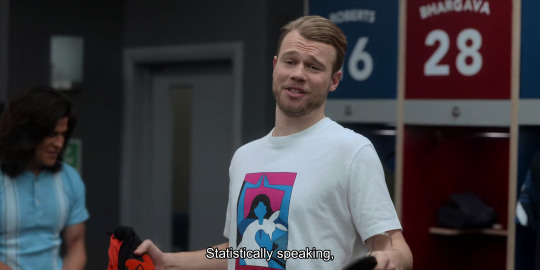

Oh interesting! Roy's choice of 4-4-2 explained is completely opposite to total football.
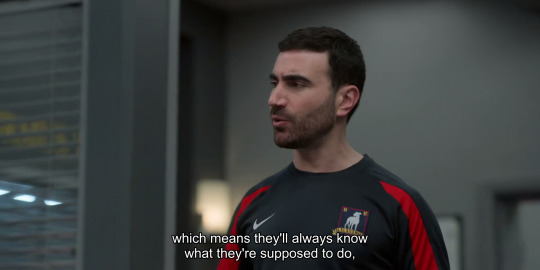
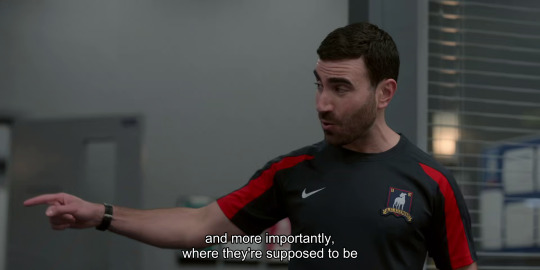
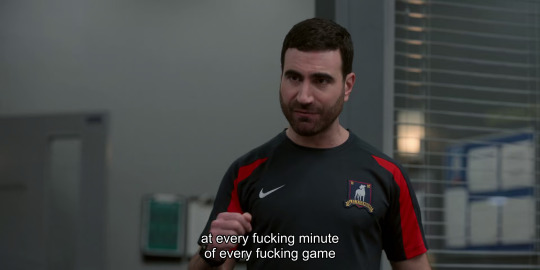
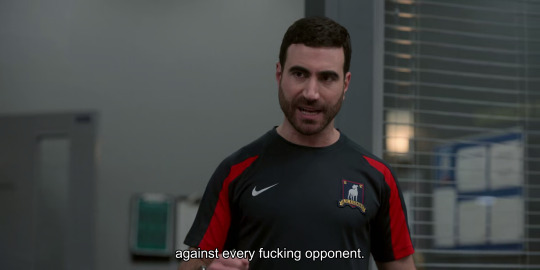
I am almost certain you cannot drive your car over that bridge towards the London Stadium, Nate.
I still can't get over Dani's face when he finds out someone writes Paddington's tweets for him.
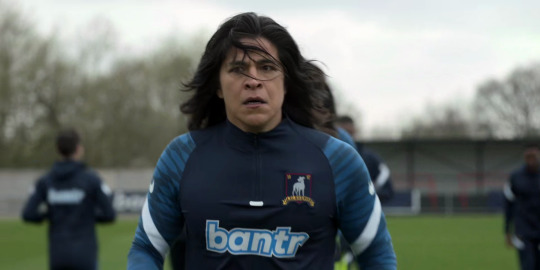
"Ain't much more scary out there than a creepy clown, right?" Cut to Rupert. 👏
Colin doing down a manhole? Asdfghjkl

We know what Field of Dreams is the UK, man. 🤦🏼♀️
Ms Kakes looks like she is dressed as Princess Leia...?? Does this mean she will be part of Rupert's downfall??
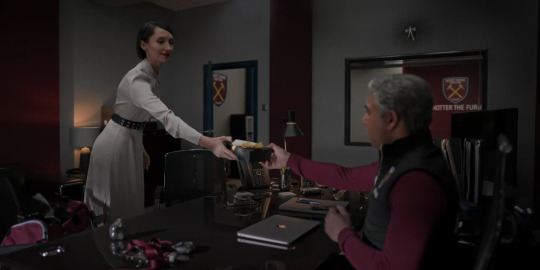
OK, but what if the whole thing of Trent writing a book isn't news to Ted and he is just winding Trent up by pretending to think about it. Like they are actually friends now or Trent already texted him about asking Rebecca and this thing is an act.
Can we get an episode of Single Guys Club à la Beard After Hours?
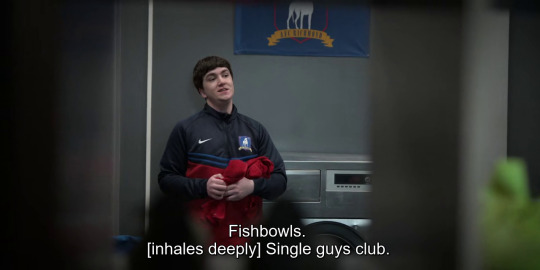
Completely contradicting what I said above, but Ted reading a football book right after he finds out Trent is going to be hanging around... this is the guy who asked him if he could explain the offside rule and asked if he was a fucking joke.
The time on Keeley's phone is 11:09, but they just had wishing time which is 11:11! Continuity!!
Fuck off, Trent Crimm. 😂😂😂
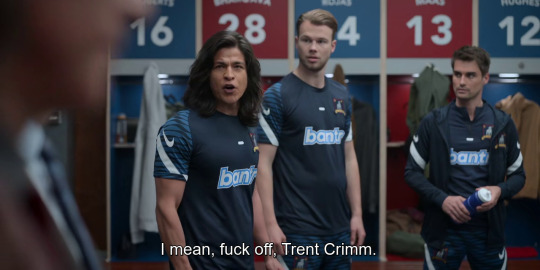
Dani still smiles are Trent when the team are ignoring him. He is a precious pure soul and should be protected at all costs.
People bought Roy white orchids! In Series 2, he questioned how Jamie Carragher knew he like white orchids when he joined Sky Sports. Great little call back.
Again, Keeley's phone says that it's 14:00, but the TV says it's 13:32 straight after. Come on, guys!
Also they say that this game is the start of the season and later Rebecca congratulates Rupert on West Ham winning yesterday.
There's just no way that Roy doesn't know what Hallmark Christmas films are. They're on everywhere here (in July as well as December!) and he's definitely watched at least one with the yoga ladies.
Underrated joke:
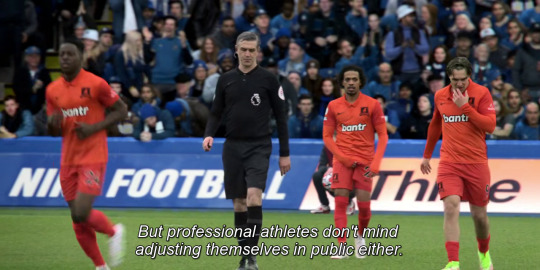
Trent's little shake of the head when the rest of the Diamond Dogs agree Julie Andrews is worth fancying... 😂
What's that? Me getting emotional over Trent's reaction to being included and validated by Ted, Beard, and Roy?
The Norm Macdonald name check was a nice nod, but I promise you, the average person in the UK would have no idea who he was.
How did I not notice that when Zava shakes hands with Keeley he kisses his own hand?
What is the choice behind this reaction, Jason??

WILL

Ted popping out from behind Zava is still hilarious.
Gahhhhhh they fucked up the graphics of the table. After the Brentford match it should be played 7 and the points should be 19. (Maybe they have fixed this on Apple since?)
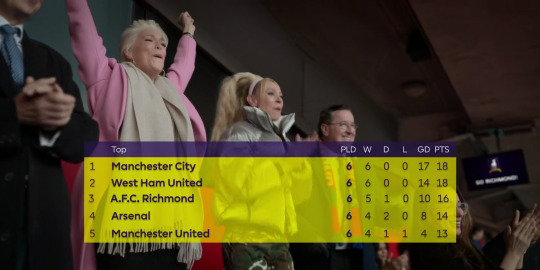
How pissed off is Isaac going to be when he finds out he has already met Colin's bf?
Rebecca's red dress. Oh boy.
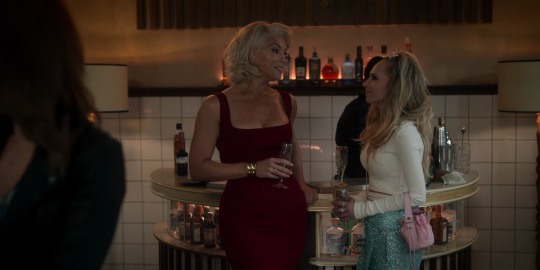
Jamie's bit with the make-up artist for the Bantr advert is so cute.
MAY A YOUNG ROBERT RETFORD PORTRAY YOU IN A FILM SOMEDAY.
Oh Nate making a stupid joke that Ted would love and Rupert not getting it (or specifically pretending not to) 😭😭😭
What season is this supposed to be?? The timestamp on the CCTV of Nate said it was 2021 so that would have been the 20/21 season making this the 21/22 season, but Ted's text messages are dated throughout 2022. The latest being to Henry on 28th October 2022.
Beat them. LOL

Nice call back to series 1 of Nate spitting out the martini.
More quotes that make me nervous:
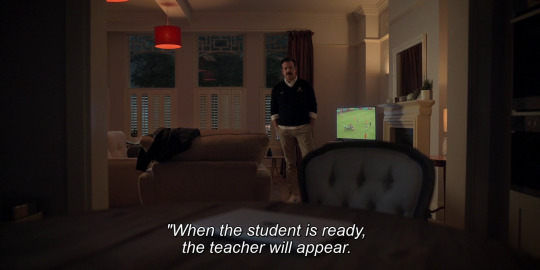
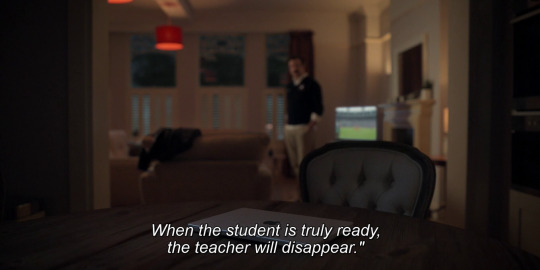
Stop letting the British characters say 'elevator' i beg of you.
I find it so unbearably uncomfortable that boat guy kisses Rebecca's foot. She should have kicked him in the face.
Isaac leopard print socks!

I can't believe they are tumbledrying Rebecca's fancy clothes.
Oh shit. The basketball game Ted remembers watching with his dad was June 1991. That's only 3 months before his dad killed himself. 😩
They were mad for this triangle hallucination business. Honestly.
When Jamie and Roy arrive back at the coach, the subtitles have Jamie saying "You lovely people", but it sounds so much like "you lucky people" and with the voice he does makes me question if it's a nod to a bicycle riding character in Spaced who says the same thing. Phil Dunster posted a video of the "inspiration" behind the bike scenes which was a clip with Simon Pegg who co-wrote the show, so maybe? VERY obscure if it is!
Still angry about Jack defacing the first edition of Sense and Sensibility.
Please learn how to say croissant.
Papa Obisanya looks like he gives such good hugs.
I love how subtly Will sticks his finger up at Jamie.

Another classic Will reaction:

The Good Dads Club:

I fucking love that Colin wore a hi-vis jacket to help clear up Sam's restaurant. Truly committing to the chameleon bit.
I will NEVER be over this:

Thought I would be ok watching this by now, but Billy's face just kills me.
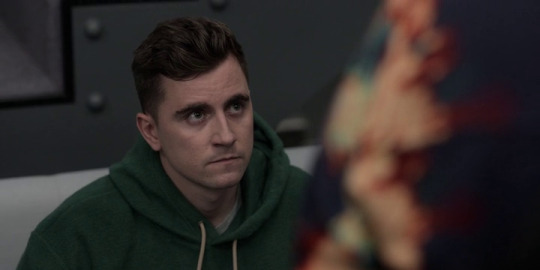
Henry being so excited to see Nate 💔
BEARD AND HENRY 😭😭😭😭
I love Keeley and Rebecca's little head movements when Ted is singing his little heart-bent song. There are so many little moments where characters are in sync with each other's movement this series. Someone should make a gifset.
Ha! I missed this line last time. Drag him, Jade.

Still think Rebecca and Marcus would be cute together.
How can this show end without Sam playing for Nigeria??? IT'S SO FUCKING SAD.
God, Hannah looks so beautiful in blue.
So. Fucking. Fond. Look at his face when Ted is pretending that he didn't realised "The Devil" was Rupert...
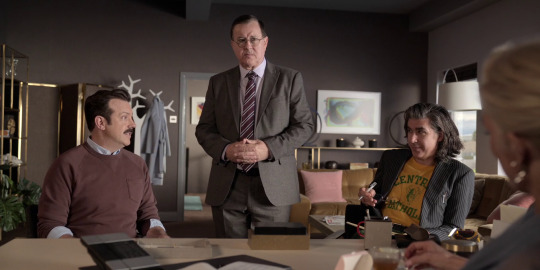
Elodie is such a fab little actor. Her face when she works out what the name on Roy's shirt spells is fantastic.
HOW CAN ANYONE CALL SAM UGLY. HE IS SO BEAUTIFUL, PLEASE.
Sam Richardson is so great. I wish I didn't have to hate Akufo so much.
Another episode, another great reaction shot from everyone with MVP Will.
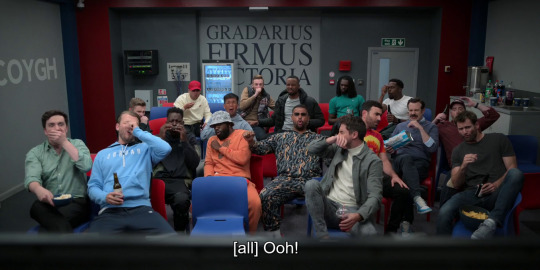
The bit before little Rebecca appears...was anyone else worried that he catching her breath was gonna be some cliché feeling faint because she was pregnant? Still a bit concerned tbh.
asdfghjkl Akufo is wearing a purple suit. Like Willy Wonka!
Oof. The Nathan stuff isn't any easier for me the second time round.
Concerned.
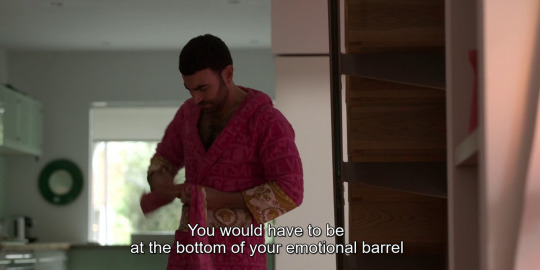
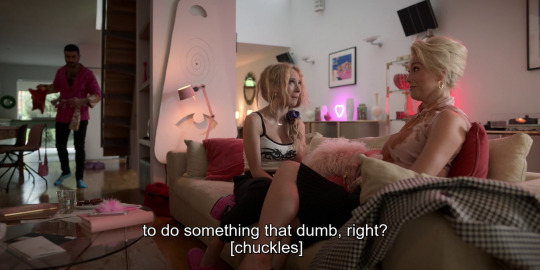
And these have been my thoughts.
#ted lasso reawatch#ted lasso#ted lasso spoilers#i think it is very obvious who my faves are from this#disproportionate amount of Will reactions#oh well.
2 notes
·
View notes
Text
told a rly cute gothy nb that i am fond and charmed by them last night after they said they liked me and we should hang out am i cooked chat
24 notes
·
View notes
Text
Idk maybe I've just witnessed people close to me fall into right wing conspiracy rabbitholes, but maybe you shouldn't put all your trust into twitter posts about something as major as election fraud
#social media can very quickly latch onto an idea and devour it#removing all critical thinking until nothing but what you want to hear is left#like piranhas#yeah it would be nice to believe that donald trump rigged the election in his favour#but so far ive seen one (1) person claiming that thier vote wasn't properly counted#and a disproportionate amount of tweets and reactions to that one (1) claiming it as absolute proof#ive seen this happen with right wing people#one simple social media post#spurs on hundreds of people agreeing and justifying and refining the ideas presented#until you have a new rightwing conspiracy#remember that propoganda goes both ways#posts made by a sleep deprived smidge
2 notes
·
View notes
Text
A Waste of Air (Why Inasa Sucks as a Character)
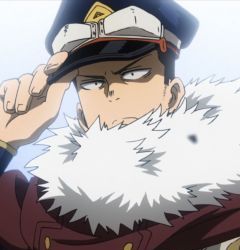
Reasoning
Boring quirk (wasted potential, uncreative)
Wind powers are so underutilized and Inasa's is no different. It effectively amounts to 'what Hellflame does but worse'.
Whereas Enji at least has some (albeit very limited) control over the form of his fire and where it comes from his body, Inasa can only move wind around in a spiral and also use it to propell himself.
His existance only serves to be a hindrance and an obstacle both to the plot and to the characters
Literally only exists as an obstacle to Shouto, backtracking on Shoto's previous growth just so Bakugo (authors pet-cough) won't fail alone.
His introduction downplays Momo's accomplishments and skill. Taking her top spot in the Recommendation Exam by turning it into a technicality because he raged quit. (she isn't even in the flashback)
His stupid backstory.
His backstory is so fucking contrived that I almost don't want to even bother going into it.
Firstly, his reaction to Shoto's demeanor is so disproportionate that it's pathetic
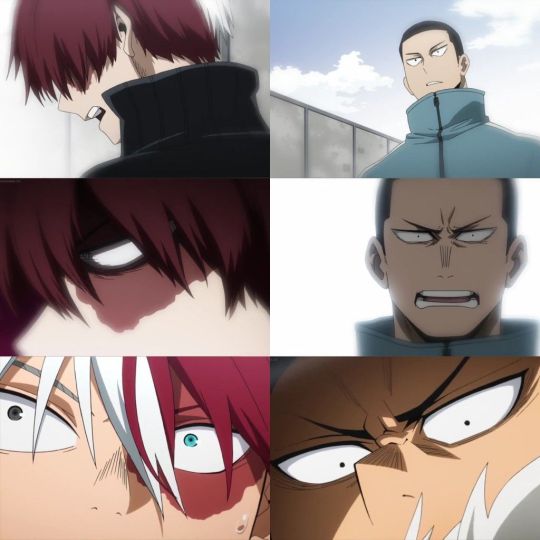
Oh boo hoo, your idol was mean to you. Yeah that would work, with anyone but Shouto. It's veery similar to the Hitoshi problem. Where he bases his opinion about something/someone he knows nothing about.
Telling Shoto he's 'just like his father' is probably the worst thing you can tell him.
Secondly, He takes Shoto's reaction/rejection in the worst way possible. If what Enji had done or said had been more severe, then his reaction would be understandable as a trauma response.
However why don't we look at what Enji said:
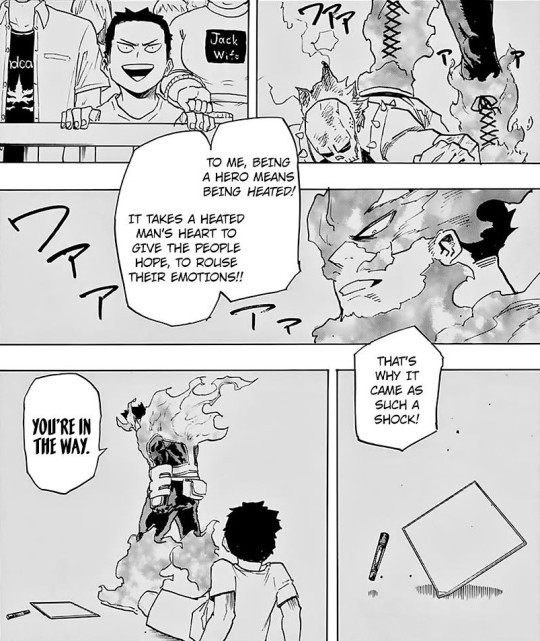
Presumably he knocked Inasa out of the way, while an incredibly unprofessional and cruel thing to do and say (especially to a child who just wants an autograph). It does not justify his reaction towards Shoto after the entrance exam nor at the licensing exam.
It doesn't justify him throwing away his spot at UA like a child.
And it certainly doesn't justify Inasa antagonizing him in the middle of an exam!
It makes Isana come off as short sighted and inconsiderate, ironically the very same way he views Enji and (because he can't or won't differentiate the two) Shoto.
How I would Write Them
I'm not just going to sit here and moan about how lacking Hori's writing can be at times, no.
I'm going to do something about it.
Genderbend (or trans that gender)
This show is in desperate need of female characters getting the spotlight and being allowed to show their skills.
Change her backstory to emphasize Enji's sexism:
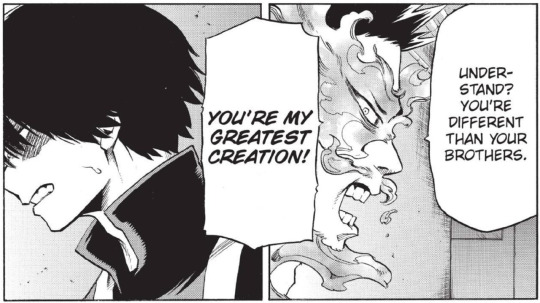
Basically she goes up to Enji after a villain arrest and excitedly tells him about how she's a fan and has been practicing very hard. She creates a decently sized tornado in her palm to show him (not much bigger than a canteen)
He then scoffs dismissively (almost snickering at her) and says something like: "Someone of your constitution would never make it to the top, stay out of the way girl and let the heroes handle it"
he glares at her before walking off with his back turned to her.
He then tosses her notebook back behind his back, burning it's corner in the process by his careless quirk use
(bonus points if the flame is snuffed via landing in a puddle, showing how her dreams were metaphorically "put out".)
Have Shoto's (unintentional) attitude remind her of Enji's insult (by dismissing her accomplishment of besting him [while still losing to Momo)
Make her resemble Rei (but not be related):
Adding another layer of connection and trauma for Shoto.
Have him seek her out instead and make her want nothing to do with him (at least at first, with the exam later forcing them to work together and gain a mutal understanding)
Upgrade her powers to something besides (Wind go wooosh).
This could be anything, personally I'd make it varied, like she's able to both mimic Air Walk and Air Cannon but can also fly around, create tornadoes and even create air pockets. Thus showing her growth and efforts.
I will say this again, Pro. Hero. Family, Make her a legacy kid. Show just how biased Hero Society can be towards those with Heroic ties.
Don't toss her after the arc is done, keep her appearances consistent, yet spaced out.
Have her appear after the Licensing Exam, highlight both 1A's growth by having her grow with them.
I would also merge the remedial course with the Licensing Exam as a sort of second portion that involves showing restraint and kindness, as well as problem solving and situation awareness in a domestic setting.
Showing that heroism is or should be more than just "punch harder, punch with feeling".
Lastly here's the design I came up with and a little information to boot.

(nothing fancy just a head and a 3rd quarter sketch, no Hero costume yet)
Isana Yaorashi, Kanji: 勇渚 (勇: brave, strong, resolute. 渚 ripple or wave (used here as a substitute for "wave" of air) also used to represent the "ripples" Enji's insult had on her life and the she impressions that she leaves on others)
Legacy Child, comes from a long line of heroes, though her parents were not about that life. Her grandfather is the one who recommended her for UA and later Shiketsu: Yoroi Musha.
Holds an intense grudge against Endeavor for his sexism and his careless/cruel tendencies. Isana wishes to show the world that "heat" isn't what makes a hero.
Personality: Very intense, a fighter to her core. Isana seldomly backs down from a challenge, however she's more than willing to push that aside to help someone in need.
Applied for both U.A and Shiketsu in advance, left due to Shoto's attitude being to remincent of an encounter she had with Endeavor's true face during her childhood.
Placed Second in the Recommendation Exam at U.A then dominated Shiketsu's Entrance Exam with a total of 100 points!.
Probably got into fights alot as a kid. Probably for good reason too.
#bnha critical#mha critical#mha rewrite#anti endeavor#anti enji todoroki#anti inasa#anti bakugou#anti bakugo katsuki#anti shinsou hitoshi#if you squint#hero society critical
103 notes
·
View notes
Text
Absolution

༺Summary༻
Astarion and Serafina have an argument and Astarion does what he thinks is necessary to keep her with him. Set before his Act 2 confession.
༺Pairing༻ Astarion x Serafina (Female Tav/OC)
༺Warnings༻ PiV sex, oral sex, all occurring while Astarion disassociates.
༺Word Count༻ 2441
༺A/N༻ Although most of my reader fics are based my Tav, Serafina, and my experience playing the game as her, this is the first fic I've written featuring her as a named character. And it's my first BG3 fic in 3rd person. I hope you all enjoy it. Thanks to @satanicspinosaurus for the wonderful beta.

The scene from earlier plays over and over in his mind.
“You don't know anything about me, Astarion! So just leave it be.” Sera, sweet, kind, gentle, patient Serafina, had yelled at him. Not once since they'd met on that beach had their erstwhile leader even raised her voice slightly at him. And today she shouted at him. All because she couldn't read Elvish and he'd reacted with the same humor she’d claimed to enjoy. Turning it on him as though he’d been the one in the wrong.
They'd been seated around the fire while Wyll took his turn “cooking”, going through some papers and books they'd found in the wake of a goblin attack. They were looking for any clues into the cult's movements or plans. Sera had plucked a small, neatly bound journal from the pile and turned it over in her hands. It was a thing clearly well-made and cared for. She'd opened it gently, respectful of the fine binding holding it all together.
Her brilliant blue eyes had scanned a few pages before she gave out a frustrated sigh. “Elvish,” she muttered, snapping it shut violently and thrusting it at Astarion. “You'll probably have better luck with that.”
He wasn't sure why he did it. The half-elf’s reaction was disproportionate to simply encountering a foreign language, that was obvious. Maybe it was because he’d become too used to teasing her since they’d started their “relationship.” Their easy back and forth banter giving him the foreign feeling of acceptance.
Or maybe it was his own way of trying to deny those irritatingly tender feelings that had started to creep in whenever he caught her glancing his way or their hands touched, or she laughed at one of his jokes. The need to push back against them, sharpening his tongue and drawing out ancient bias.
Whatever caused it, he should’ve thought before opening his mouth. “Can’t read Espruar? Someone got forgotten by one parent. Is that why you threw a tantrum and ran-”
“Shut up!” Sera leapt up from the log she’d been seated on and glared at him. “You don’t know anything about me, Astarion! So just leave it be.”
With that, she’d stormed off and left him silently stunned, as though awaiting a reprisal that didn’t come. Around him, their companions pretended to look away and he caught a few whispers on the air. “What are you all looking at? It’s not my fault she suddenly can’t take a joke.” He’d sulked off to his own tent, waiting until her tantrum had passed and everyone forgot his misstep. He’d assumed Sera would cool down and come out for dinner, but instead she’d remained stubbornly locked away. Karlach had brought her a bowl of what they were generously calling stew.
Everyone had eaten and retired for the evening and she was still pouting. Which brought him to now, slinking his way across camp toward her tent. He had to do something, he couldn't watch his hard won protection slip away. It absolutely had nothing to do with the fact that Sera gave him a little kiss and wished him goodnight every other night lately and it had been noticeably withheld tonight.
The way the moonlight filtered through the trees, one solid beam pointing down on her tent, a poet might say that Selune was guiding him. Poets were idiots. Parting the flap just the smallest amount, he starts to slip inside, intent on waking her to settle things if he needed to, when a sound stopped him. A strangled cry, was it directed at him? He froze, half inside, the errant moonbeam that slipped around him haloing her with soft illumination.
Another wordless cry. Only a nightmare, nothing to be concerned with. Stepping in, he lets the tent shut, plunging them both back into darkness. With a predator’s stealth, he approaches her bedroll, kneeling down, eyes subconsciously glancing at the healing puncture wounds on her neck.
“Let me out.” Her sudden words startle him.
Stumbling backwards, he nearly loses his balance to go sprawling across the floor. His skin suddenly heated, as though the breath that carried those words could burn him.
Another sob comes as she thrashes around a bit. “Please, I won't run,” unintelligible sounds follow the small plea. “Let me out.”
Locked up. She'd been locked up too. Regaining himself, he crept toward her again, as she shook and cried. Someone had hurt her. But who would want to do that?
She was Sera, unfailingly kind; who aided refugees, saved children, fought monsters, and foolishly fed manipulative vampires.
The sobbing becomes frantic and without thinking he reaches out to gently grasp her shoulder. “Sera,” she struggles against his touch with a whimper. Growling in frustration, he shakes her a little more roughly. “Serafina!”
Eyes snap open to behold him with wide pupils as her chest heaves. “A-Astarion?” Sitting quickly, she pulls away from him, and he feels a sudden sting in his chest. “What are you doing here?” She hisses, apparently still angry with him.
“You were having a nightmare.” He replies, trying to soften his voice, to be the lover she had come to expect.
“Hmm,” her eyes focus across the tent to an empty lantern, “fiat lux.” Small little motes of light appear in the lantern, swirling gently in their prison, as Sera draws her knees up to her chest. “Well, I'm awake now, you can go.”
The forlorn gaze and empty voice were nothing like the Serafina he'd come to know and the unsettled sensation in the back of his mind grows. He cleares his throat, trying to get the words moving. “I didn’t come just to wake you up, I wanted to…apologize. For earlier. I’m sorry, the joke was in poor taste.”
Turning her head, she glances his way from where it rested on her knees. She looks so small like this, so far from the fierce woman who’d led them from the moment of the crash. “Apology accepted, I probably took it too personally.”
It didn’t quite ring true, but he plows on anyway, hoping maybe those blue eyes would light back up for him. “The truth is, I’m actually a bit rusty with Espruar myself. But maybe I could teach you and it would be good practice for me.” He affects the warmest smile he could, sure the gesture would win her over.
Instead, she shrugs. “Don’t worry about it. It doesn’t actually matter all that much. Thanks for the thought though. You can go, I’m not still mad at you. I’ll see you in the morning.”
That was not his Serafina. He has to do something, to fix this. To keep her on his side. Reaching out, he wraps his arms around her and pulls her into his lap, lips closing over hers. “What’s this about?” She huffs as her skin began to flush a pretty pink.
“Pleading my apology some more,” his voice drops to the low sultry tone that made her pulse jump in a way he could hear.
“I said you were forgiven.” Despite her protest, her arms encircle his neck, pulling him closer.
“Your words said that, but your eyes spoke differently.” His lips trace a line of kisses from her lips to the lobe of her ear, making her sigh.
This was what he could do for her, what he did best. It was a skill honed by two hundred years of unwilling practice, and like so many before, a skill she was willing to make use of. At least it was easy enough with Sera, she was sweet and gentle, and he knew she'd never harm him. And it wasn't as though a part of him didn't want her, she was a pretty little thing. That part was just bound up with all the other parts that hated what his body had been used for. If he had to open his pants for anyone, he supposes he was glad it was her.
“I meant it, but- gods Astarion!” He runs his tongue along the point of her ear, less sensitive than his, but still enough to start driving her mad.
“In that case, we'll call it making up for my behavior earlier.” Guiding her to face him, legs straddling his, her warm core settles against his hips. He kisses his way back down to her throat, already feeling his mind growing distant from his actions.
Lips linger near the marks on her neck, and she squirms in his lap. “Do you want to?”
He could never say no to that offer. Without hesitation, his fangs sink into her flesh, and succulent liquid pours into his throat. It adds to what little pleasure he’s able to wring from what he was about to do. Sera whimpers and writhes in his lap, grinding down on his growing erection. She hadn’t started out allowing him to feed on her as some form of pleasure, but she had given him her neck as often as the rest of her body, and the two had become inextricably tied together.
Just a sip for tonight, after everything that had happened, he couldn’t ask too much. Too soon he pulls his fangs away to lap at the remainders and kiss the wounds. Blood and a distant mind, this was good as it would be for him. “Let's get this out of the way.” Fingers grip the hem of her shirt and guide it over her head.
She shivers as the night air caresses her skin and leans into him. It was almost enough to make him laugh, there was nothing about him that could provide any warmth. Instead he continues kissing his way down her chest, nipping lightly until her back arches into him and she makes a needy noise.
“Patience,” he chides her, releasing his grip on her to remove his own shirt.
Hands encircle her waist in an iron grip, holding her firmly in place while tongue and teeth tease her rosebud nipples. Fingers trace his back as she pants, trying to contain all the noises that could wake the camp. Her nails ghost along his flesh, and he senses she longs to dig them in.. She hadn’t even attempted to ask about it. Why did she afford him such gentleness, was she wary that it would be too much on his scarred flesh?
Lips leave off her hardened peaks to capture hers again, and she grinds against him even harder. No doubt her small clothes were soaked. “You drive me mad,” she whispers, lost in desire.
Just as he’d wanted, Serafina, hurt feelings and nightmares forgotten. “You enjoy it.” He captured her lip between his teeth for a second and nibbles. “Stand up, take your pants off for me.” He awaits her on his knees, as a penitent seeking their absolution.
She’s so occupied, she doesn’t notice as his gaze finds the dancing lights in the lantern, and watches them swirl aimlessly until she’s naked before him. Gripping her thighs, he pulls her in, holding them apart so his tongue can swipe along her sex, as soaked as he predicted. Sera’s not a bard, but she sings for him anyway. Fingers grip into his curls, not too tightly. Sometimes he wishes she wouldn’t be so damn gentle, that she'd be like everyone else, someone easy to use, instead of, whatever all this was.
“Astarion,” she keens as he slips two fingers inside her, tongue running over her clit.
He laps and suckles at it almost as fiercely as he does the wounds he leaves in her neck. The fingers inside her find the spot that causes her knees to buckle and another cry to leave her. She’s close, just a little more, and he could leave it for the night.
“I want you inside me.” He stiffens, inhaling deeply.
“Do you now, my sweet?” He nips her thigh playfully with his fangs while his stomach drops. “Then come down here.”
As soon she hits her knees, he's positioning her on all fours, he can’t look her in the eyes right now. He tears his pants open, eyes finding the lights again, concentrating on them as he pushes inside her. She’s warm and wet as she pushes back against him, eager to have all of him. Because she chooses him. No matter how many of his rough edges and dark corners she finds, she wants him. Would she still want him if she saw it all?
Forget it, he tells himself, pushing that thought away. He clears his mind until there’s only the moment, the sensation left, hips slapping against hers, the way her body clenches around his cock, how she eagerly sucks the fingers he puts in her mouth so she has something to absorb the moans.
It’s almost enough to completely lose himself, his cock twitches. It’s spectacular, the way she meets every thrust and takes everything he has to give. “Touch yourself,” he urges, eager for her to come undone.
Her own fingers slide between her folds, working feverishly. It’s not long before the noises muffled by his fingers become frantic and she tightens around him.
“That’s it, my darling, let go.” With another deep thrust, he allows himself a release. “Sera,” he gasps, knowing it will please her to hear her name on his lips.
They collapse next to one another on the bedroll, Sera quick to snuggle up in his arms. It takes longer than it should to embrace her, his body wanting to run. “Is everything alright?” She asks, innocently, from where she lays, head on his chest. Maybe there are merciful gods, she can’t see his face.
“Of course, love. I think I may have worn myself out after all the walking today.” Softly, he kisses her head, he can’t let her suspect.
“Well don’t complain tomorrow, Lae’zel will blame me for sure. I don’t think I was very discreet.” She laughs, sounding like sleep is already returning to her.
“But you are to blame. If you weren’t so irresistible.” He tries to laugh as well. This stupid, sweet girl, why does she lay in a monster’s arms and giggle?
With a yawn, she gives him an out. “You should probably go, I’m going to fall asleep soon and don’t want to trap you here.”
One more kiss, even as his mind insists on fleeing. “Goodnight my love, rest well, and I’m sorry again.”
“For what?”
“For earlier.” For everything.
Tag list:
@micropoe10 @writingmysanity @mxxny-lupin @azu21
@tallymonster @dependsonthedream @sunfire-ancunin
@bambamwolf87 @fayeriess @lumienyx @lisrelly
@elora-the-slutty-songstress @bhaalbaaby @spacebarbarianweird
@darlingxdragon @wanderingisobel @astarionsbeloved
@vixstarria @claryvoyantfray @volotramp @misscrissfemmefatale @bg3obsessedsideblog @captainaceofspades @wickedwitchofthewilds @asterordinary
#bg3#astarion#baldurs gate 3#baldurs gate 3 fanfic#astarion x tav#bg3 tav#bg3 tav: Serafina#my fanfic#my writing#astarion x oc
182 notes
·
View notes
Note
https://www.tumblr.com/crooked-wasteland/772318292242284544/im-not-going-to-post-the-whole-thing-because-it?source=share
Thank you for this sane and rational take on the situation.
The amount of pearl clutching going on made me feel crazy
IMO, yes, what Limus did was weird, but the reaction towards what she did is SO disproportionately ?????
Alex is a grown man??? Why are so many treating him like he was held at gunpoint and forced to sign it??? Even other critics were jumping on this and I was so confused
I've pointed out repeatedly on Twitter how Brightman stopped a Q&A when it came to his attention that a child was present. He asked where the parents were and, since they were there and okay with what was happening, he let it go. It's obvious that the situation was uncomfortable for him, but he reasonably recognized that it wasn't his child and other people can screw up their kids however they like. But that is an example of Brightman having his boundaries and exerting them at a convention. To a much larger scale than a one-on-one with someone asking for a signature. He is not helpless, nor forced to do things he is strongly opposed to.
But the fandom is just creating a narrative based on Medrano's posts. If you ever questioned if Stolas was a self-insert, here is the confirmation. It's genuinely amusing to me how her "Fee-fees" are what are injured by this event, but she projects that onto Alex Brightman. And now the fans are creating this fallacy of him being forced into signing this piece of paper. This whole situation is exactly how the shows function on a narrative level and all the character flaws seem to be rooted in the personality of the creator.
I cannot deny this is at least a little entertaining to see how life imitates "art".
29 notes
·
View notes
Text
The slut-shaming of Nesta Archeron “A Court of Thorns and Roses”
Nesta Archeron, a character from Sarah J. Maas’s A Court of Mist and Fury, faces a significant amount of slut-shaming, reflecting society’s toxic attitudes towards women and their sexuality. The criticism often stems from her unapologetic nature and her relationships, particularly her interactions with Cassian and her past.
It’s particularly disgusting that someone felt entitled to publicly shame her on platforms like TikTok, belittling her worth and character. Comments claiming she “wouldn’t get two coppers” for her actions or choices dehumanize her, reducing her to mere labels rather than acknowledging her complexity as a character.
The situation surrounding Nesta Archeron began as a TikTok trend, where certain users created videos mocking her character, often highlighting her more controversial choices and relationships. Initially, it seemed like just another social media fad, but it quickly escalated into a larger conversation about slut-shaming and the double standards faced by female characters in the A Court of Thorns and Roses series.
Anti-Nesta sentiment grew as these videos went viral, leading to an onslaught of derogatory comments and dismissive attitudes toward her. This backlash often seems disproportionate, particularly when compared to how other characters like Rhysand, Feyre, and Mor—who have also navigated their own sexual relationships—are treated. Critics of Nesta often ignore her complex backstory, including her trauma and struggles with mental health, opting instead to reduce her to simplistic labels.
While I can’t speak for all Nesta stans, many I’ve encountered are deeply empathetic toward her character and recognize the unfairness of the criticism she receives. These fans would never condone shaming other characters for their choices, particularly those like Rhysand or Feyre, who have also engaged in relationships that could be scrutinized.
It’s completely valid to have mixed feelings about a character like Nesta Archeron; characters are often designed to evoke strong reactions, and not everyone will resonate with her choices or personality. However, the line between critique and shaming is crucial, and crossing it can be harmful.
Shaming Nesta for her actions reflects a misogynistic double standard that often targets female characters for their sexuality, while male characters escape similar scrutiny. This kind of behavior perpetuates a toxic culture that punishes women for their desires and choices, branding them with derogatory labels rather than allowing for the complexity of their experiences.
Moreover, this type of shaming can reinforce harmful stereotypes about women in society, suggesting that they must adhere to strict moral codes regarding their sexuality. Such attitudes not only diminish the character’s depth but also contribute to a broader narrative that stigmatizes women for embracing their autonomy.
It’s important to remember that fictional characters can inspire meaningful discussions about morality, trauma, and personal growth without resorting to harmful insults. Critique should focus on character development and storytelling rather than reducing individuals to their sexual choices.
This behavior not only harms the character being targeted but also speaks volumes about the shamer’s values and priorities. It shows a willingness to judge others harshly without considering their complexities, struggles, or growth. Instead of fostering dialogue that could lead to a richer understanding of the character and their narrative arc, shaming reduces discussions to simplistic and often cruel judgments.
Moreover, such attitudes can create a toxic environment within fandoms, alienating those who resonate with the character’s experiences and struggles.
#anti acosf#anti acotar#anti feysand#anti inner circle#anti rhysand#nesta archeron deserves better#pro nesta#anti amren#anti azriel#anti cassian#anti morrigan
29 notes
·
View notes
Note
THANK YOU I AGREE WITH YOUR AEMOND POST 1 MILLION %. Some of the replies are so frustrating, all you were doing is discussing the writers' decisions this season regarding Aemond, and how simplistic it would be for Aemond's motivations to betray Aegon to be based on the brothel scene. You put into words everything wrong with Aemond's arc this season and I tremendously agree! I feel that the writers are flip-flopping with Aemond and Aegon's relationship, first they were enemies as children, then Aemond lost his eye and they seemed to be on the same page, then AEGON'S SON WAS VICIOUSLY BRUTALLY MURDERED AND AEMOND IS (besides showing no character evolution driven remorse to speak of) BACK TO HATING AEGON AGAIN?! THAT'S HIS BROTHER. HIS NEPHEW. HIS SISTER'S KID. Aemond had zero fucks to give!
The fandom's reaction to Aemond has been so embarrassing! Why is he not held accountable for ANYTHING. EVER. I defended Aemond all through S1 and will always defend him from TB but HE'S A GROWN MAN NOW. He just doesn't show empathy for Aegon after Jahaerys' death, your brother is grieving and he swears Aegon is his King and he's his hitman and he will always serve his ass. IF THEY HAVE AEMOND MURDER AEGON BECAUSE HE TEASED HIM IN A BROTHEL WHAT EVEN IS THIS. Really bad writing. Really cringe too.
So don't worry there are some of us who whole heartedly agree with you and don't coddle Aemond a grown man, with the same standards season after season and hold him accountable for the sin of hoping he grows as a character even if he is heading for a darker turn.
thank you so much, anon, for this unexpected reply, as i'm hanging out at the airport with not much to do 😅
yeah, i think that, ON PAPER, aemond turning on his brother as a result of years of bullying is believable, sure, BUT. the bullying truly needs to be horrific to explain away the urge to commit basically three of the most grievous crimes in westeros: kingslaying, kinslaying and usurpation. like. no one takes those things lightly. and, i'm sorry, but teasing just doesn't cut it. i think that a lot of people may be kind of projecting their own personal grievances with school bullies onto aemond, which is natural to an extent, but they have to step back a little and realise that being rude or hurtful to someone just doesn't, in any way, merit a reaction so disproportionate that it amounts to soul-drenching crimes
in that regard, last season i was 100% on aemond's side as well, because, well, MUTILATION might warrant such an escalation in violence. compared to all that pent-up anger aemond felt for luke, the aegond rivalry is just not really well done. it COULD have been, but, without having seen ep 4, it feels very milquetoast and, most of all, unearned.
honestly, i think gwen emphasized really well the fact that we're in a fandom obsessed with their headcanons and brainrot, to the extent that it becomes difficult to separate the backstory one has created for some character with what has actually appeared on screen. what we've seen so far has only been mockery, and i get that, when you're a kid, it's very difficult to go through, but we are talking about murdering your sibling here. i mean, no, i don't think "it makes perfect sense". ALSO. pointing that out doesn't mean you're invalidating the trauma of bullying victims, let us please separate people's real experiences from fictional experiences, which 1. are fake and 2. can be improperly presented in media, which is what we are critiquing in the first place
on a final note, i have had people on my post clinging to this idea that, just because the writers had aemond say (in the most bored tone in existence) that he regrets "the business with luke" (or however the hell he phrases it) means that the writers want to communicate to us that he feels sorry over jaehaerys. please. they must either be aliens that are just now learning about human emotion OR they want to relay that aemond isn't really all that bothered fundamentally. his reaction is basically the stoned out version of this gif!
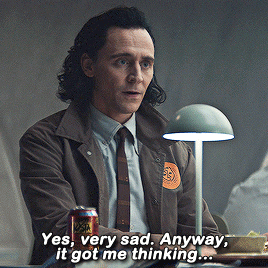
but, anyway, as dumb as aemond's reasons are or aren't, what ultimately brings the whole rivalry down is that they really didn't invest in creating any dramatic tension between these two. think of the scene at storm's end, it's the literal version of "you could have cut the tension in the room with a knife" and it's only a few minutes long. so it can be done. they just don't care OR, because of this stupid trend of reducing the number of episodes in a season, aegond was just one of those things that hit the cutting room floor. so we can all blame capitalism for rook's rest. 😅
#unfortunately asks that are too complicated are gonna have to wait y'all i can't be writing essays on the go 🫶#aegon ii targaryen#aegon & aemond#ask#anon#hotd critical [storytelling]#anti aemond targaryen#lmfao look at me using that tag
38 notes
·
View notes
Text
i actually really like the snappy pacing of s4 (even if i’m not overly crazy about the whole Fellow Finding Reality Show arc) and i honestly think it benefited from the shortened episode count BUT that said. so curious about what s4 might have been like if the writers strike hadn’t necessitated cutting it short. i think the overall shape of it would’ve been the same (house’s head/wilson’s heart are just too good) but here’s a list of stuff i think we would’ve seen/i would’ve liked to have seen if s4 had had a full 24 episodes:
-i think we probably would’ve gotten a lot more chase and cameron (and specifically Chameron Relationship Moments). this is based on the fact that a) we do get more of those in s5, when the episode count goes back to normal, b) we got so much build-up with them in the second half of s3 (i am not immune to punching the air when cameron shows up at chase's apartment in the s3 finale) that it does feel a bit weird that we barely see them together, and c) cameron especially does get a few moments of trying to prove she's the Best House Whisperer this season combined with the documentary episode of her making chase watch her chant 'i am not in love with house :)' in the mirror and i think there would've been more made of that if there'd been more episodes
-AMBER. i think we would've gotten a hell of a lot more amber + that her and wilson would've been together longer. i also think we would've seen a lot more of house and amber which imo is the main downside of this season being so short - house's head seems to allude to him having a crush on her by the time of the crash? or like. at least respecting her as a person which is more than you can say for most people. and i think a longer episode count would've allowed us to see more of that and/or let that simmer and fester for longer. anyway. amber in any capacity. send tweet.
-call me crazy but i think we would've seen more cole. i know we already get a disproportionate amount of focus/info on him given that he's never heard from or mentioned again after house fires him but part of me wonders if this is because he was supposed to have come back in another guest role at the tail end of the season and then that got cut but the rest of his stuff remained. would've been cool to lock him and cameron in a room together since she essentially goaded him into violence and all. maybe i just have too much faith in the writers for this one
-call me crazy again but a part of me wonders if this might have been The Huddy season. both because i read somewhere that lisa edelstein apparently had a sign saying that shippers should support the strike if they wanted more huddy (#based, always support a picket line) but also because like. the huddy slowburn is ridiculously long. by the time they got together i wasn’t even rooting for them anymore i was just ready for the arc to be over (and to be clear: i really like huddy). this is really speculative territory because obviously it wouldve had a massive knock on effect on later seasons (most of s5 and s6 gets knocked over by this) but like at the very least i think they probably would’ve kissed by the end of a full-length s4.
-i think it would’ve taken a bit longer for foreman to rejoin the team/he would’ve been a bit more of a stinker about it. emphasis on ‘bit’; i actually like how quick it is he regresses back to the fellowship/how fast he immediately resorts to malpractice at mercy (now there’s a spinoff title) but i think he probably would’ve stuck it out for another episode longer. maybe one and a half.
-absolutely we would’ve had a comedic subplot in some random episode about people trying to guess thirteen’s real name/their reaction to it. iirc the first time we heard her Actual name said Out Loud is with cuddy yelling at her over air bubble guy in house’s head. if there’d been time i just know there would’ve been a moment about this. that said i do find the canon reveal really fucking funny because for a moment when i first watched that episode i was like ‘who the FUCK is dr hadley’ which was probably the intended experience lmfaooo
-i think we might have gotten a few more sown seeds about house’s worsening addiction / mental health problems that obviously end up coming to a head in the final episodes of s5. nothing super big, but just a hint or two that something is Brewing.
-old fraud (henry) probably would’ve come back for an episode as house’s PA. or he gets hired as cuddy’s assistant (we know she runs through them like water) and house feels betrayed and there’s a silly prank war about it or whatever. hey for someone who doesn’t like the finding fellows arc i keep mentioning the discarded fellows a lot
-i know chase’s sister is a crazy s8 retcon (compels me tho) but can you guys please hold my hand where i imagine a world where there’s a subplot with him and cameron having a blowout argument where he reveals her existence to her and cameron tries to force him to reconcile with her. Ok you can stop holding it now i recognise that this is pure copium and never would’ve happened since we don’t find out about this sister until 4 fucking seasons later but it was a nice idea right
-this would’ve been a great season for a requisite Musical Episode. we get a lot of fun one-offs in s5 and 6 (lucas’s failed spinoff launch, 5 to 9, wilson) and this is the season with the documentary episode (that doubles as both the Meta Episode and the Noir Episode) so like. the writers were already armed and ready with their long-running cable show special episode notebooks. there probably would’ve been a ‘you can’t always get what you want’ fakeout. i’m not a fan of musical episodes and so would’ve hated every moment of it but i am a person of the people.
#house md#hate crimes md#gregory house#allison cameron#robert chase#amber volakis#why YES i wrote this instead of working on the time loop fic.#don’t worry about it.
28 notes
·
View notes
Text
Maintaining Scope of Violence in Your Story's World
I saw an interesting discussion in the Baldur's Gate 3 subreddit, commenting how a player's immersion was broken when a version of the player character, known as "The Dark Urge", is apparently to blame for a particularly brutal murder and yet the companion characters don't turn on him/her/them immediately. The commenter was baffled given the brutality of the killing. Yet many replies pointed out that other members of the party are also murderers or tapdancing on the edge of committing atrocities, not to mention other mitigating circumstances that it would be spoilers to go into.
This got me thinking about scope of violence in genre fiction and how, on top of all the other difficult jobs the writer has before them, establishing what level of violence is "commonplace" vs "shocking" can be a surprisingly delicate process.
(Cut for length. Includes references to Game of Thrones, House of the Dragon, John Wick, and NBC's Hannibal in an exploration of how to establish the scope and scale of on-screen violence. TW for discussions of violence against children in shows like GoT and HotD, though it is largely in abstract terms.)
I'm reminded of "House of the Dragon" (HotD) which, I must confess, I found to have rather patchy and uneven writing.
One moment in HotD that I found rather dissonant, shall we say, was when a child of the nobility loses his eye in a brawl with other children. His mother, an aristocrat, is understandably horrified and enraged. However, some of the threats she makes to equally powerful Houses over the incident feel, dare I say, disproportionate to the event, given that her threats could lead to the world as she knows it being plunged into civil war, all over what amounts to a tussle between children, albeit one that ends in a particularly gruesome manner.
On the one hand, any modern mother likely would completely freak out at such an appalling injury as a lost eye from a knife fight between children. That would be a major shock to a modern community, where such violence is quite rare. And in fairness, the aristocrats of the world of "Game of Thrones" and HotD by extension are largely insulated by their privilege from the day to day violence we see portrayed in the series. If anyone was realistically going to have a modern response to a child's maiming, it would be the sheltered daughter of a noble house with regards to her beloved child.
However, as understandable as her reaction might be to modern viewers and to those who take into account her sheltered upbringing, in my mind, the show's narrative wobbled there in terms of establishing the level of violence that is considered commonplace in the world of HotD/GoT. In the first season of Game of Thrones, we famously saw a child pushed out of a window, permanently disabled and left in a coma for months, and while this is a major event that creates a great deal of tension and conflict, ultimately the family after their attempts at individual revenge the fact is they can't start a civil war over this single event. So in a way we're sort of left with: this is just a thing that happens that we have to suck up and deal with, even if certain individuals might wish to and continue to pursue a personal vendetta. Couple that with commoner children being murdered and the deaths going completely unremarked upon by wider society, we're left with the impression of a world in which brutality, even brutality against children which would grind a modern community to a halt, is simply an ugly and relatively common part of life. A life with so much ugliness and personal violence that it really almost gets lost amidst all the other horrors.
Which makes the HotD mother's reaction feel... disproportionate. Not in relation to her child's suffering, which is entirely understandable, but her view of what retaliation constitutes a proportional response comes across as hysterical. Too modern. Children are horrifically injured in the GoT/HotD world all the time. Frankly, by comparison, a lost eye is almost minor compared to a loss of mobility in a rigorously martial world, access to which Bran lost with his fall. We don't get as good of a set up of what the conflicting morals of this world are, we don't get the comparison between commoner and noble children as clearly as in GoT, we don't really get all the conflicting views of "When is it normal to start a civil war over a child's injury?" - the sense of scope and scale of violence and how we and the characters are supposed to react to it... wobbles.
Along these lines, I've also pointed out that in shows like NBC's Hannibal, the show is scrupulously careful about not really referencing global events like wars. In my mind, there's a simple reason for that. Your average drone attack on civilians in the Middle East kills more innocent people by accident than Hannibal Lecter has ever killed in his entire murderous career. Compared to weapons of war, one murderous serial killer is barely a rounding error in terms of death and human suffering. So the show has to remain almost claustrophobically intimate so we never get confronted with the "So what?" of the individual death and human suffering Hannibal and the other serial killers bring about on a very close, personal basis. The horror style is meant to force us to imagine ourselves if we were the victims (or the killer) in these incredibly intimate murders. If our suffering was writ large. If every individual death was massively significant. But this is in contrast with real world mass casualty events which would dwarf many times all of the deaths in the Hannibal show combined.
As a final example, the moment the first season of "True Detective" lost me was when the value of a single life also wobbled dramatically. The conceit of the show is that a single murder, or a half dozen at most, murders of young white women is worthy of a major, multi-year investigation. Yet when the investigation inadvertently leads to an outbreak of violence in a predominantly black community, shown almost immediately to kill more people (in front of their children, even) than were lost in the entire murder spree of white women that's being investigated, the show didn't seem to care at all. Individual white female victims were worthy of a breathless investigation into their untimely loss, but twice that number of black people killed in an outbreak of violence directly linked to the investigation didn't even seem worthy of commentary or reflection at all. The value of a single human life was no longer consistent. If these deaths aren't worthy of justice, then why should I care about the few individual deaths being investigated?
As with any measuring of scope in fiction, it's very hard for the author to do alone. It really is an instance where an outside pair of eyes is incredibly valuable.
But things to keep in mind while crafting a narrative around violence is just how much are readers or viewers supposed to be alarmed by individual acts of violence. It's common and indeed necessary for modern media to establish the rules of its world. Even stories nominally set in "our" world actually do almost as much worldbuilding as any fantasy tale in this respect. In a cop drama where each episode is built around a single murder, we need to inhabit a world where a single murder is worthy of dozens of people spending time and resources bringing the killer to justice. In such a world, a mass casualty event of several deaths should be shocking. To this end, like in NBC's Hannibal, it's probably best to avoid mentions of mass casualty events caused by war or natural disasters.
By contrast, an action film like John Wick might place less value on individual deaths (beyond the motivating deaths of a single dog, which is thoroughly commented on within the story as feeling disproportionate and therein lies much of what makes the plot so unique. I'd argue it is also the cutest dog ever born, but I digress). We're not going to see a lurid headline, "John Wick murders 26 local men in cold blood, read about this tragic loss along with quotes by their devastated wives and children on page 6". To a certain extent, the violence there is meant to be just shocking enough to thrill, but we're not meant to get too invested in the details of the actual body count.
And, to go even more extreme, in war or disaster movies, we see or have narrated that thousands have died at a time. Again, to go back to Game of Thrones/House of the Dragon, one reason it's hard to see the mother's reaction to her child's maiming as anything but a bit disproportionate is because we see with such brutality hundreds if not thousands of men, women, and children dying directly or indirectly as a result of war. While it's understandable that a mother would burn the world down for an injury to her child, we're not well placed to agree with or sympathize with her reactions on the broader scale, in terms of retribution that would lead to war, against a backdrop of brutal mass casualty events in the thousands where even more families are devastated and more children injured or killed.
As a final, positive word on the Game of Thrones universe, the early seasons of the GoT were actually very good at controlling the audience's reaction to the scope of violence. Namely, the Battle of the Blackwater sticks out in my mind. The world of GoT is so grounded in the mud, in ugly, personal but intimate violence done with hands or blades, otherwise rudimentary weapons, that the first time we see an explosion on a near-modern scale feels as genuinely breathtaking to modern eyes as it might have to the Medieval-eseque eyes of that world. Yet there are movies chock-full of explosions where the explosions lose impact and importance, become background noise, because they're simply one of many. By rigorously tamping down and limiting the scope and type of violence to largely hand to hand combat, Game of Thrones set up a moment where modern warfare-style explosions are awe-inspiring. Against that backdrop, the appearance of fire-breathing dragons on the battlefield is also arresting, though their capabilities would likely be dwarfed by a modern fighter jet and many viewers of GoT would be familiar with films where the scope and scale of violence is much bigger and more explosive. It feels big in GoT because the scope and scale has been so small to that point.
Once you as a writer have established the modernity of your violence, the scope and scale of it, the average body count, the importance of a single human life, it's important to stick to it. If a character has a differing view, then they should be noted as having it by the narrative. A grizzled war veteran might shrug at a small town murder investigation of a single individual, but a sleepy town might lose its mind over it. In the modern world, the lives of children are put on the highest pedestal, but once you establish in your world that some children's lives are of lower value, then showing a mother act with an understandable modern sensibility of horror and outrage still needs to be commented on so we understand where her reaction falls within her society, especially if it's in contrast. That is what teaches us how to watch and appreciate the narrative choices as they're meant to be appreciated.
150 notes
·
View notes
Text
trans rights
The basic claim of trans rights isn't that trans people exist (a non-negotiable human fact) but that trans people deserve everything available to cis people, in the same way that the original feminist claim was not that women exist but rather that they are equally as human as men.
The shift in material terms (what opportunities we have, how we are treated and so on) as well as societal understanding of us is that we are not implicitly sexual objects, the same as the original feminist push for change.
Along the way to explaining this to people we have to divorce the notions of sexuality and gender, which many cis people still do not understand as distinct, but although they are divorced, sexuality and gender are not completely alienated from one another. Gender and sexuality are friends with benefits.
Trans people put a lot of labour into their gender.
(Please read Wages for transition if you haven't)
The labour that trans people put into their gender is quite visible in ways that the labour that cis people put into their gender is not. For many cis people this creates an implicit impression that trans people by existing are claiming that their gender is more valuable than cis people's. This exists quite comfortably in a society that never talks about trans people unless it acknowledges their existence as sex workers or fetish objects, but not in a society that would treat trans people as equally human. Therefore a push for social and legal equality for trans people is, in the minds of those cis people, a push for a society in which it is broadly accepted that some people's gender is more valuable.
However, we already live in a society where it is broadly accepted that some people have more valuable gender than others. "Hot" people, many of whom put a significant amount of labour into their gender, are also treated as having more valuable genders than others. I'd like to draw attention to the obvious similarity between transmisogynistic rhetoric and ideology and the rhetoric and ideology of incels. Incels believe in a sexual hierarchy which essentially treats "more sex" as better and reflexively indicative of a more valuable person, rather than a uniquely communicated and negotiated consensual connection between two or more people.
(We could also draw a parallel between people's reaction to nonbinary people and people's reactions to vegans, i.e. "so you think you're better than me?")
Under patriarchy, women are treated as responsible for the reproduction of society, which is often essentialised as an inherent (biological) quality of women. Trans women, assumed by people who are not trans women to not be burdened with a disproportionate share of reproductive labour, are treated by transmisogynists as getting to enjoy all the aspects of being a woman (implicitly under patriarchy being a woman is doing more gender than being a man) without paying the price for being a woman.
When we say that we are gender abolitionists we simply mean that we are feminists, and that we wish to abolish societal hierarchies based on gender and allow people to self-determine and fully control their own gender without it having implications on their social status. Naturally the relations between genders are not abolished unless they are hierarchical because gender is frequently constructed through gendered relations. This, again, is why sexuality and gender remain close despite the fallout from their earlier codependent relationship. We should, in fact, want a billion squillion kajillion genders because allowing people to treat gender as a multifaceted social performance instead of an inherent characteristic rigidly attached to sex, we support implicitly the abolition of cisheteropatriarchy.
429 notes
·
View notes
Note
Hello!
I hope I'm not being invasive by posting this ask.
My names is Zade and I run a blog dedicated to Baldur's Gate 3.
Both the game and its fandom have a huge racism issue.
About the game: There is only one black core companion in the game, Wyll, whose story ties directly to the events of the game. He is a textbook prince charming. He also is the companion with the least amount of content and a lot of it is bugged. The writers even publicly mock him and dismiss the issues he faces in-game (he is subdued by a devil that is white-coded). Fans have been sending reports to the developpers for months and are consistently ignored in favour of fans of the more popular (white) companions/NPCs.
A new patch was released a few days ago where Wyll was once again sidelined. This led to a lot of outrage and some responses to that outrage tap directly into the fandom's antiblackness.
About the fandom: Since the game was released, gamers have repeatedly dismissed Wyll as being boring and go to great lenght to justify why they don't interact with him. They purposefully ignore the fact that the character was rewritten late in production in-part because people who played the beta version of the game couldn't handle him having flaws and depth. As of today, he is the least represented in fanarts and posts concerning him will generally receive less engagement than those featuring his white counterparts.
It's no mystery that a lot of Wyll's fans are POC. Those same fans are consistently called aggressive and hostile by the white fandom when they demand that all main companions are treated with the same amount of care. They refuse to see the racism the only black companion faces both inside and outside the game. Our reactions and demands are described as disproportionate and entitled.
I thought this ongoing issue could be of interest to you.
Bonus: A petition is going around to tackle his lack of content and care by the developpers here.

hey thanks for messaging us!!! this ask is not a bother at all :D this is what we're here for. Sadly I know more about bg3 because of the fandom antiblackness against Wyll than anything positive at this point. (I found this article which was similar to an ask one of our blogs got I'm so sorry I can't seem to find it https://www.themarysue.com/baldurs-gate-3-is-the-latest-target-of-racist-dog-whistle-mods/)
Thanks for this summary, blog promotion, and fandom racism breakdown I looked through the first page and it looks great so far!!!
Followers please go give Zade a follow on the blog @absansombre and check out the petition!
mod ali
#wyll ravengard#baldurs gate 3#bg3#fandom anti blackness#whitewashing mods#video games#racism in gaming
64 notes
·
View notes
Text
TF2 analysis - on cultural references, context as characterization, and how to analyze comedy
-taps mic- HELLO, TEAM FORTRESS 2 COMMUNITY !
A while back, I received an ask requesting analysis of one of my favorite video games of all time and special interest of 12+ years, and you know I just had to go and turn that into a several thousand word essay for the reading pleasure of the people.
Because that shit got way too long, I’ve decided to put it into a post of its own. Hopefully a big title and no previous context being necessary will give more people an incentive to read it. I spent a long time on it and I think it’s pretty cool, and I would love some nice attention for my effort. ;w;
The ask I received went a little something like this:
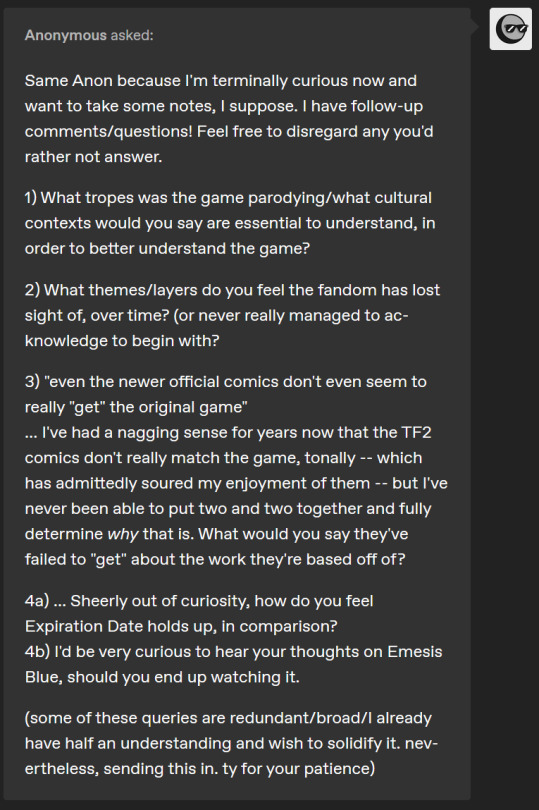
Below the cut, I will be replying to these questions individually. It touches on everything from Cold War propaganda to the media landscape at the game’s launch in 2007 to first-person shooters as a genre - all to gain a better understanding of author intent, expected audience reaction, characterization and themes.
Anon previously requested help writing more accurate fanfiction, and damn it, that is what they are going to get!! and MORE
Introductory disclaimer:
First of all, for clarity's sake: this analysis is going to specifically talk about TF2 as seen through a fandom lens. I'm going to be talking about the game as a piece of media, creator intention, and the fandom's reactions to the game and extended canon - that is, the slice of the TF2 fandom that is interested in the characters, in the world and in doing at least semi-faithful fanworks.
I will not be touching on TF2's wider playerbase or meme culture. I greatly enjoy both, but they are not relevant to the post I made that sparked this anon's questions (I will link this post in the replies, in case anyone is curious).
I also have to disclaim that any references I make to real world history in this post have to be taken with a hard grain of salt. I've done my best to fact-check everything, but I am not infallible! For a better understanding of the historical elements I talk about here, please do your own research, and approach my claims with a healthy amount of scepticism, same as you would any unsourced social media post. (Readers may notice examples I give below primarily feature Soldier, Spy and Scout. This is because I feel I have the most solid grasp on the historical events and media that informs their characters, compared to the other classes. All the classes contain these contexts and meta complexities, but in an effort to not talk out of my ass too much, I have decided to focus on the characters I feel the most confident dissecting.)
>1) What tropes was the game parodying/what cultural contexts would you say are essential to understand, in order to better understand the game?
The characters of TF2 were specifically designed as satiric takes on national stereotypes depicted in American propaganda media during the Cold War. Two easy-to-explain examples to illustrate:
- Soldier embodies the ideal of a "red-blooded American" who is strong, brave, hyper-masculine, hates foreign superpowers, loves the vague ideal of "freedom" and firmly believes America is the greatest nation in the world. He prides himself on having personally murdered nazis in the past, despite actually having accomplished no such thing (comparable to the US taking a disproportionate amount of credit for defeating Nazi Germany in World War 2; at the time, WW2 was a very recent cultural memory that made for good propaganda fodder). He fears, hates and dehumanizes communists (as Soviet Russia was the US's highly-villified opponent during the Cold War). The satiric angle: he is depicted as so brainwashed by propaganda that he has become immune to facts and logic. He is horribly sadistic, brutal, paranoid and xenophobic. The ideal he is based on is portrayed as shockingly and disproportionally violent and illogical to the point of being laughable.
- Spy is based on how the US viewed France during the Cold War: as a weak, cowardly, “unmanly” nation. At the time, France was depicted this way because they were perceived to have surrendered to Nazi Germany early on in World War 2 out of cowardice. Spy is one of the least macho of the mercs, he is ineffective when fighting enemies head on, and his main method of attack is reliant on trickery and “not fighting fair.” The satiric angle: Spy isn't actually much of a coward - he is more intelligent, more tactical and more resourceful than many of the others, and simply doesn’t feel the need to risk his neck when he could be working smarter, not harder. The other characters are portrayed as a bunch of meatheads for picking on him. The negative stereotype he is based on is portrayed as largely unearned and ridiculous. (Though note that Spy is also depicted as an upperclass prick to contrast with Engineer being working class; in that dynamic, Spy is depicted as a pompous asshole, while Engie is depicted in a more favorable light. The characters are multi-faceted and no class is universally “better” or “worse” than the others, but right now I'm specifically focusing on the "Cold War stereotype" aspect.)
Notice how, while these two characters have different nationalities in-universe, they are both based on stereotypes seen through an American lens. Notice the way the American character is based on a comedically deconstructed ideal, while the character from a nation the US did not view favorably at the time is depicted as falsely judged by an unfair and ridiculous metric.
The entire TF2 cast and universe revolves on this axis! It takes old American ideals and prejudices and uses them for comedy, adding exaggeration and caveats to make those ideals look absurd.
It’s a parody of media produced in the US during the Cold War, which contained massive amounts of propaganda. It satirizes the political ideals that were glorified in said propaganda media.
Very important extra cultural context: this satiric depiction of old war propaganda was specifically designed to be instantly recognizable to TF2's central demographic at the time of release in 2007.
Older Valve games like TF2 were very specifically made to appeal to pop culture-savvy, nerdy young adult gamers. This demographic was expected to see the characters and think "oh hey, it's like a funny version of X character type I've seen in movies!"
Because those kinds of movies were still everywhere at the time. The Cold War ended in 1991. TF2 was released only 16 years later. To put this into perspective: the Legally Blonde movie came out 22 years ago, in 2001. Think about how many Legally Blonde memes are still floating around the web today, how fondly remembered this one movie is and how often it’s still referenced in contemporary media. Now consider that media produced during the Cold War was fresher in the cultural memory at the time of TF2′s release than Legally Blonde is for us today.
TF2 was never meant to be seen in a vacuum. It was always meant to be in conversation with old media that it expected everyone playing to be extremely familiar with.
I'll say that again: the cast of TF2 are based on Cold War stereotypes - comedically exaggerated - so they would clearly read as parodies to people in 2007.
Those are 3 different overlapping lenses to consider when approaching the characters.
The characters are more than just funny cartoon men with guns and an unusual amount of differing accents. They are commentary on older media trends.
Now, someone might ask - why did the developers choose this specific aesthetic and tone for their online shooter video game?
The developers have stated multiple reasons, including wanting the characters to be immediately recognizable both physically (they generally look like the stereotypical depictions they're based on) and audibly (the differing accents and regional dialects make it easy to identify which class is yelling in your ear mid-combat during gameplay).
However, I also have another theory:
It's been confirmed TF2's comedic tone was designed to combat a lot of negative aspects of shooters in the genre at the time of its creation. I have seen developers discuss that they were going for a lighthearted atmosphere to discourage player hostility.
I, personally, also think it is extremely likely the developers opted for satirizing old war propaganda partially in order to combat the tendency of other shooters often being war propaganda. Valve has always been a politically left-leaning company, with a history of depicting military-like forces and unchecked capitalism in a negative light (see the Half-Life and Portal series, respectively).
By depicting the cast of TF2 as generally unhinged, illogical and clownish, they were able to communicate to players: "War is dumb, nationalism is dumb, whatever Call of Duty has been telling you is cool is actually illogical and copying it makes you look like like an idiot. That being said, we all sometimes wish we could beat the shit out of other people in the desert with a shovel, so let's get our aggressions out in a safe, non-serious environment with no consequences. Come play pretend you're a murderous sadist blowing up equally unhinged people with us, it's silly, but it's so fun."
I believe everything from the cartoonishly over-the-top, non-permanent deaths to the deserted, remote environments, to the lack of any truly innocent or defenseless characters was all a carefully crafted foundation made to encourage players to make the informed decision to leave their inhibitions and moral hangups at the door. They wanted players to have fun and go nuts engaging in military-like violence, without encouraging pro-military attitudes in their playerbase.
For an example of a game that royally screwed up doing the same thing, just look at Overwatch - it tried to preach a "wholesome" vibe that was completely mismatched with its gameplay. Overwatch tries to justify extreme violence as Okay When Good Guys Do It To Bad Guys, which ... yeah, again, that is straight up modern military propaganda, on purpose or not (and knowing the US military’s tendency to pour money into video games that glorify war, “on purpose” isn’t as much of a stretch as one might think). Paradoxically, TF2 comes out both looking and feeling better to play, because it handles aligning player emotions VS in-game actions much more elegantly. It accounts for common pitfalls in its genre. OW jumps into those pitfalls with both legs and instead ends up looking shallow and nauseatingly twee.
Of course, all of this is personal speculation. Whether or not this was the reading that Valve intended, I do believe it's a big reason why TF2 has remained so profoundly loveable over the years - it uses its writing and art direction to put the player in the perfect mindspace to Fuck Shit Up.
It's a fantastic example of how to carefully and artfully craft something extremely stupid for maximum intended effect. It uses the strengths of comedy as a genre to its absolute fullest.
Unfortunately, because of cultural shifts since the game's release, newer fans do end up missing out on a lot of what makes this game so expertly done. Many newer fans don't come into the game with the base cultural knowledge it expected of its original audience. To gain a better grasp on the characters and enjoy this piece of media as it was intended, I think it will be extremely helpful to familiarize yourself with the material it is referencing.
For an introduction to media produced and influenced by the Cold War, I would recommend the Wikipedia article Culture during the Cold War as a starting point.
(I have skimmed, but not read, the full article; I encourage readers to be especially source-critical when engaging with pages like this that detail themes of history and propaganda - it's a starting point, not a finish line!)
>2) What themes/layers do you feel the fandom has lost sight of, over time? (or never really managed to acknowledge to begin with?)
Some of this is covered in the previous section, but I'll use this question as an opportunity to talk about another thing I feel is overlooked by fans (and, frankly, the writers of the newer comics too), especially when creating fanworks:
The fact that the characters are extremely dependent on their setup and narrative context to be likeable.
Something I think fandom culture struggles with in general is interpreting and handling fictional characters not as real, independent people who exist in a vacuum, but as the sum total of countless moving parts inside a narrative all working together to create the impression of a real person.
In a comedy, characters are especially dependent on presentation to feel like themselves. It is not enough to loyally recreate an arbitrary list of personality traits in order to create accurate fanworks - recreating the sorts of situations they get into, the kinds of people they interact with, and cherry-picking the information they have access to is neccessary for bringing out what makes the characters so charming!
This is especially important when interpreting and handling a cast made up exclusively of characters who are mean people with bad intentions, bad opinions and a complete lack of adequate self-reflection across the board.
Canon makes them all come off amazingly likeable, but this is because the writers were manipulating tone, relationship dynamics, setting, and much more to show off the characters at their most distinct, least detestable and absolute funniest.
Overlooking this aspect of writing comedy characters often leads to a very common pitfall in many, many fandoms out there - following the logic of a character's canon personality to a place they don't like, and getting rid of those personality traits to combat their own discomfort.
Making characters too kind, too understanding, too progressive, etc., is an endless source of micharacterization in fandoms in general, but especially in fandoms of media where the characters are a bunch of dicks in canon.
To be clear, I fully understand where this is coming from. Fans get attached to characters like these because they're funny (and intended to be loved!) - realizing that a character you really like would logically react in an unlikeable way if you put them into certain situations feels bad. No one wants to turn a character they love into something they find they don't love anymore.
But this is where carefully engineering your setup and narrative comes into play.
Example:
A lot of TF2 fans are queer. Queers flock to TF2 because let’s face it, the campy vibes and silly fun masculinity and weird women are like catnip to us.
But a lot of queer fans go into the fandom aspect of the game and find that ... wait, shit, these characters are not exactly pillars of progressiveness. Reconciling some of the extremist political views of the characters with queer narratives, with queer values, seems a daunting task to some. Because what’s a queer fan to do? Portray a character they love in a way that makes them unloveable? Painstakingly depict shitty, uncomfortable characterization in the name of “realism” that ultimately detracts from their own and other people’s enjoyment of the story? That’s not fun. Fandom is supposed to be fun. So, what, do they just portray the characters as miraculously having perfectly amicable social politics by the standards of the larger queer community in 2023?
Some do, of course, for their own comfort, and it’s understandable, but it’s not good storytelling. It’s an excessively shallow way of interacting with media - the fanfiction equivalent of confidently sitting down to write an in-depth, flowery review of a horror movie you watched with your hands over your eyes during all the scary parts. You cannot create fanworks that are even remotely faithful to the spirit of the canon while deliberately ignoring the core themes and author intention of the canon you’re working with. These things are, unfortunately, mutually exclusive. TF2 characters are meant to be wrong about most things politically. Hopefully my reply to the first question in this post adequately illustrates why that’s so important.
But the good news is that bastardizing canon in order to avoid making characters unlikeable also isn’t necessary.
There’s a reason Soldier, in canon mocks his enemies for everything from failing at masculinity to being disabled, yet doesn’t have a single homophobic line:
The people writing his lines figured it would detract from the character. It would hurt real people’s feelings and make the character less fun to play as, so they didn’t include it. No excuses, no explanation; it is simply omitted for the sake of likeability.
(For contrast, notice that the writers did not extend the same kindness to certain other minorities, like fat people - playing as Heavy fucking sucks when you’re fat, because every other class hurls fatphobic abuse at him. This is a fuck-up on the writers’ side; they failed to identify this type of humor as meaningfully detracting from the experience for a significant amount of players, and so ignorantly decided to include it.)
This is what I mean by “setup and narrative context.” I also like to call this “maneuvering”, because it involves selectively portraying a character in contexts and situations where they shine and instill the intended audience reaction, while steering them away from situations where they would logically act in ways that counteract how the audience is intended to feel about them.
Fanworks can absolutely do the same thing! Fanworks can even take the technique further, because they’re not bound by limited time and focus, the way the original work is!
Sticking with the above example of wondering What The Hell To Do when portraying a character who, due to the ideal he’s satirizing, should by all rights be on the wrong side of history in relation to queer rights, let me make a bold statement:
Soldier TF2 is not homophobic. He's a nationalist, a right-winger, a sexist, a xenophobe - but he's not homophobic.
Why? Because he just so happens to never encounter any gay people in canon. They happen to never cross his mind. He's thinking about other shit. If there's a Pride riot in Teufort, he just so happens to be looking the other way.
Soldier TF2 is not homophobic, because he can't think for himself. He's an idea, a fraction of a bigger narrative that he does not exist outside of.
And if he needs to encounter gay people in a fanfiction, don’t just passively follow the logic of his character to that uncomfortable place none of us enjoy going to - use that maneuvering! Make him misinformed, make him misunderstand, give him incomplete information - the character is not only a face with personality traits attached, his soul is also in the context of the story!
Make him homophobic, but he's pretty sure only Europeans can be gay (just look at them!), and it's already so damn sad that they weren't born in beautiful, paradisical AMERICA, so he pities them instead of hating them. Make him think he's successfully being homophobic, but he has misunderstood what a gay person is and thinks it's a particularly venomous type of snake (men who kiss other men are fine, why would he care about that when there are HORRIBLE HOMOSEXUALS slithering around in the desert that he needs to go blow up right now before they bring this glorious nation to ruin). Make him homophobic, but literally "phobic" - he's shaking and crying hiding inside a cupboard, and his newly-outed gay friends have to lure him out with canned meat and a trail of small American flags, treating him like a feral cat that needs a little time and space to get used to people.
That's funny. It's likeable, it's charming. He isn't portrayed as a good person, or woke in a way that clashes with the themes of his character, but with a little maneuvering, he is faithful to what makes him such a legendary character in canon - being a silly caricature that brings us joy.
If Soldier himself needs to be gay? There are ways to make it happen. Same approach. Get creative. Make it silly. Go for thematically appropriate comedic explanations, not cop-outs or realism*.
That is what I think the TF2 fandom is lacking - understanding of how to manipulate context to make a character feel like their own unique, lovable selves.
Characters are not just visuals and personality traits. They are also what happens to them, what they conveniently find out, what they happen to miss.
This is the same for every story, but it is especially important to understand in a comedy. Doubly so in a whimsical, hyper-violent, morbid comedy like TF2.
It's one of the most important layers to be able to recognize, and an even more important one to be willing to try to recreate.
*Unless you feel like doing a deliberate deconstruction, in which case, go ham, sometimes actively engaging with canon means doing some real weird stuff to it to make a certain point on a meta level. This is obviously different from the issues I described above.
>3) "even the newer official comics don't even seem to really "get" the original game" … I've had a nagging sense for years now that the TF2 comics don't really match the game, tonally -- which has admittedly soured my enjoyment of them -- but I've never been able to put two and two together and fully determine why that is. What would you say they've failed to "get" about the work they're based off of?
While I very much love the newer comics on their own merits, I do think they are wildly removed from the game, and lack a lot of depth by comparison.
I believe the greatest failing of the comics, especially the long-form comic, is that the writers do not seem to be aware of either of the subjects I covered above.
They do not handle the satirical aspect well. The newer comic writers don't even really seem to be aware that there is a satirical aspect - they treat the world as just a silly version of mid-1900′s media, with a narrow focus on silver age comics (which were primarily superhero comics, not an easy genre to match with TF2′s more grounded setting - see the comic’s limp attempt at doing a Superman parody with Sniper) + a dash of the Man’s Life magazines (would have been a good match, if not for the fact that it’s primarily used as aesthetics, with no attention given to themes the way the game does with its own media references). They attempt to write parody only, and even the parody aspect is a hollow effort. Crucially, the writers don't seem to have much of an opinion of the old media properties they're parodying, and without opinions to guide a parody, it becomes shallow and lifeless. "Mid-1900′s media was a bit silly, right?" isn't enough of a hot take to justify its existence. It needs an axis on which to spin to feel complete.
Reiterating the point I made in my answer to question 1: the game's satirical aspect circled the point that was "American media made during the Cold War pushed a narrative that was illogical and ridiculously misaligned with reality."
Its absurd humor is grounded in reality and follows a thematic red thread that the comic does not. As a result, the comic (again, primarily later entries) loses a lot of the sting and edge of the game.
Even though the comic attempts to be more serious and "dark" at certain points, the much more silly and easy-going game (and Meet the Team videos, not to mention) comes out looking more mature, interesting and layered, even though many of the layers remain subtextual. The game is fully married to comedy and has no intention of "getting real", but it is loyal to the spirit of satire. It has opinions. It has bite.
In the game and early supplementary material, there is a dread and horror in the subtext that the comics tried to bring to light later on, but the comic writers didn't know what the scary thing behind the curtain was.
The scary thing was - is - the Cold War.
The scary thing is the dread injected into the genre it's satirizing by people who wanted American readers and movie-goers to be afraid. Scaring people into compliance, into finding a sense of safety and comfort in their national identity, was the entire purpose of many, many pieces of media released at the time.
The comic writers didn't notice the subtext and figured they had to make up their own reasons for why the world of TF2 is so utterly fucked.
They didn't understand the cultural context, and they missed the mark entirely.
This also hindered the comic writers' ability to reproduce the game's humor and characterization. Without understanding where exactly the game's humor was coming from or why the characters were so likeable despite being horrible people, they lacked direction. They made the characters at the same time too impassionate, too stupid, too uncaring, and too nice. All together, the characters became less interesting, less likeable.
Example:
- In the game, Spy was not intended to be Scout's father. Spy having a relationship with Scout's mother emphasized Spy's craftiness and intelligence (undermining the enemy team not only through brute force, but through infiltrating their personal lives), and showed off the strengths of his aforementioned "softness" and sentimentality (he's the only mercenary shown to have consistent luck with women). It also emphasized the flaws in Scout's worldview, and his status as the team underdog, and showed a clear contrast to Scout's non-existent love life. Spy came out of the situation funny and likeable because he 1. was portrayed as cool and capable in a way the other mercs aren't, and 2. his softer side is simultaneously humorously endearing, consistent with the rest of his characterization, and highly informed by the satirical aspect of his character in a way that clicks perfectly thematically. Scout comes out of the situation likeable because his ego is balanced out by his bad luck - you can simultaneously see that he's trying too hard and why he's trying too hard. Spy and Scout's dynamic in-game is also fun and interesting, because you have a tough, hyper-violent, wannabe-macho young man who is desperate to gain the respect of both his team and his enemies getting freaking owned by a guy who is nowhere near the impressive-tough-guy ideal Scout strives to embody. The game's satirical points inform the characters and their actions, which gives the comedy depth and nuance, which in turn makes all characters involved fun to watch and easy to get invested in. It is the establishing of and subsequent pointing-and-laughing-at an ideal that produces engaging, character-driven comedy in this situation.
- By contrast, the comics decided that Spy was Scout's father. Spy's motives for getting involved with Scout's mother is no longer about gaining intel on his enemies. In this version of events, his motives are reduced to merely wanting to reconnect with an old flame. This completely undermines the dynamic described above, for multiple reasons: the situation no longer shows Spy as having a particular skillset that sets him apart from the other mercs, he is no longer portrayed as emotionally "softer" than the others (in fact, having left a poor woman to raise and feed 8 kids on her own while he was off enjoying his upperclass life makes him look incredibly cold in a way that is distinctly unfunny; I don’t think the writers thought this part through), Scout's comedic poor luck is no longer on display, and the "macho character is humiliated by the type of guy he respects the least" satirical aspect no longer works. There is an attempt to replace it with a mutual "ugh, I'm related to this guy?" running gag, but it's a very pale substitute for the layered, strongly characterized, thematically appropriate dynamic present in the original game. Spy comes out of it looking like more of a cowardly, cold-hearted fuck-up than a hilariously brilliant tactician with a heart. Scout comes off way too pitiable, because he is not responsible for his own misery here, and the person horribly bullying him and picking apart his self-esteem on the battlefield is his absent father who abandoned him as a child. He's not an objectively badass character who nonetheless fucks himself over in humorous ways trying to chase an ideal that objectively sucks - he's just a regular shitty guy who ended up in bad circumstances because of things outside of his control.
The comic writers didn't understand what Spy and Scout respectively represented in the game, and because of this, they didn't realize they were taking the characters off the rails and making them much less interesting as a result. They didn't realize they were killing off an endless source of comedy that supported the game's satirical angle in a fun, unique, dynamic way.
It resulted in a flat, flavorless subplot. It had some superficial attempts at "heartwarming" moments ...
... but here's my take: if the writers wanted to include more warmth and sincerity in the comics, wouldn't it have been way more heartwarming if Spy started treating Scout as his son even though he wasn't?
Would it not have been way more endearing to see him look out for his girlfriend's child, not because he has any personal ties to him himself, but because he knew if anything happened to Scout, his mother would be devastated?
Why not build from there? Why not make it an active choice? Why not preserve the existing dynamic and themes, and just follow that narrative thread to its logical conclusion?
Spy has an established sentimental side. Scout is desperate for approval. The reluctant surrogate father/son development practically writes itself. It would have been such a good way to explore TF2's themes more explicitly, too!
But again, the comic writers did not seem to realize the game even had themes.
I do like the newer comics. I do think they're really fun, and I did even enjoy the "Spy is Scout's father" subplot in its own way. But this complete inability to identify the game's themes, and thus the source of all its comedy, and thus the red thread defining characterization - it resulted in supplemental material that was lackluster, directionless and unable to scratch the same itch the game does.
They're good comics, but they're hardly TF2 comics.
>4a) … Sheerly out of curiosity, how do you feel Expiration Date holds up, in comparison?
Similar to the way I dislike Spy being revealed to be Scout’s biological father for coming off as a stilted, superficial attempt at being “heartwarming,” I also immensely dislike later supplementary material trying to promote Ms. Pauling to Scout’s recurring love interest for the exact same reason. Expiration Date pushes this subplot way past its breaking point and shows off extremely well why the “jerk characters are secretly a bunch of softies” treatment is so deeply, deeply out of place in TF2.
Back in the early comics, Scout hitting on Miss Pauling was played as a joke at his expense. He was an idiotic, sexist guy incapable of talking to a pretty woman without trying to fuck - she was a highly skilled and deviously manipulative minor character who mostly existed to show off how dangerously competent the Administrator and her people were. Scout acting like an utter dumbass too entrenched in his own limited worldview to notice what was happening right in front of him was important characterization for him, Miss Pauling’s quiet, calculating efficiency was important characterization for her boss, and their clashing personalities set the tone for the dynamic between the entire team of mercenaries and the conspiracy going on right under their noses.
Expiration Date chose to eliminate these layers and invent a completely new conflict for these two specific characters to go play with in a corner, which had nothing to do with their original characterization or the larger plot. Scout is now portrayed as being genuinely in love with Pauling, even noticing small details about her mannerisms and knowing about some of her interests, even though the entire point of their original interactions were that Scout was so busy trying to live his tough-guy-with-a-pretty-girl-on-his-arm fantasy he did not bother to listen to or learn anything about the women unfortunate enough to cross his path, allowing Pauling to carry out her job without causing suspicion.
Instead, Scout’s sexist approach to interacting with women is played for sympathy (”he’s actually a romantic underdog because the lady he likes accurately clocked him as an idiot!”) and inadvertently validated (”once she gave him a chance, she found out he’s actually a pretty okay guy!”).
In the process, Miss Pauling loses far too much of her usual competence, being visibly freaked out over having to perform a job she’s been shown to handle with grace in the past, and being taken aback by what should by all rights be routine weirdness in this world, all so she can have an eye-roll-worthy forced positive reaction to the entire experience at the end of the short, in a weak attempt to justify why she comes to like Scout more despite all the trouble he’s caused for her and wants to spend more time with him in the future.
The romance subplot is only made possible because the characters are heavily edited compared to their past portrayals, is only able to develop in the direction it does by aligning itself with the values of a character who existed to be a laughable, obviously-mistaken caricature, and is only able to distill a happy ending to the whole mess by stripping the other character of personal standards and agency.
Scout and Pauling are frankly two halves of a whole shitshow in Expiration Date, because the writers either didn’t notice or didn’t care about what older works were gunning for - all they saw was that Boy Liked Girl, Girl Did Not Like Boy, and that just wouldn’t stand! After all, everyone likes romance, right?
Scout, as he is portrayed in the game and in the early supplementary material, is one of my absolute favorites of the mercs. I find him incredibly funny, and the way his hyperactive, fun-loving, jokey traits overlap with his intense bloodlust (literally - he’s the class with the most weapons available that cause bleed damage!) and barely-suppressed rage makes him fun and fascinating. The little man has so much unchecked ADHD and cultural trauma he just has to go and kill people about it, which is just so intensely relatable in the “forbidden mood” way TF2 handles so well.
Unfortunately, I get the impression he has in later years fallen victim to the curse of being a skinny young white guy character, making him a target for writers who think every series needs a relatable everyman protagonist for either themselves or the audience to project onto (and who think skinny young white guys are the most relatable people around, for reasons you can probably imagine I’m not personally very fond of).
TF2 absolutely does not need a character like that, and butchering Scout’s established personality in the name of “relatable” and “wholesome” is first of all Some Bullshit, and second of all a lost cause. The character simply has too much baggage as an over-the-top caricature to be comfortably rewired into an author- or audience-surrogate. He’s always going to come out looking like an asshole - whether this aspect of his character turns out likeable or unlikeable is entirely controlled by whether the story itself acknowledges it.
I did find Scout and Spy's dynamic to be quite well done, though, especially if you ignore the "Spy is Scout's father" reveal from the later comics.
The idea that Spy didn't have to go and do all that, but has grown a soft spot for Scout purely because his girlfriend clearly loves her incredibly annoying boy and her happiness is his happiness, is perfectly in-character. Scout has also long been established to desperately crave approval from his teammates, and on paper, the idea of putting him in a situation where he had to let go of some of his macho man dignity, imitate Spy more closely and ultimately win a tiny bit of that approval he's been looking for is interesting and plays well with the game's existing themes.
It's just a shame Scout's motivations ended up being conjured out of thin air, in direct conflict with past characterization, for the purpose of enabling a schmaltzy, tonally dissonant romantic subplot.
tl;dr, I'm conflicted on the subject of Expiration Date. It's funny, it's cute when it's not trying too hard, and seeing the mercs dick around off the clock getting into stupid shenanigans together is something I've always wanted to see in a longer animated format. It’s largely a good time and a fun watch, despite its questionable gender politics and trope-y execution.
However, like the newer comics, it suffers immensely from writers who are simply unable to identify the themes, characterization and comedy style of older material, and thus, in my opinion, falls way, way short of its potential.
>4b) I'd be very curious to hear your thoughts on Emesis Blue, should you end up watching it.
I'll be sure to share my opinions if I ever get around to watching it!! I'm super curious about it. As I mentioned in another post, what little I've heard of it seems much more on-point thematically, and even with the characters being so far removed from their official characterization, I really get the impression this is a deliberate, informed choice, in stark contrast to the newer official supplementary material. I’ll be sure to drop some words on it if I ever get around to watching the full thing!
Anyway, that about wraps up my thoughts! If you’ve read this far, thank you for sticking with it, and please do consider reblogging - I’ve spent an insane amount of time writing and re-writing and fact-checking this, and I would love for it to reach just half of all the people who were curious about my initial posts on the subject. :’)
Follow-up questions are very welcome, though to be clear: I’m not really interested in “debating” the subjects I’ve talked about here. I know I posit a lot of hard opinions in this post and not everyone is going to agree with me and that’s fine - if you feel differently, I invite you to simply ignore me and write your own take on your own blog. No hard feelings, I just don’t enjoy those kinds of discussions. (Corrections on any factual mistakes I’ve made are of course encouraged).
#team fortress 2#tf2#tf2 analysis#tf2 meta#tf2 comics#soldier tf2#spy tf2#analyzing comedy#analyzing satire#deerchatter
224 notes
·
View notes
Text
So Why Do I Keep Talking About Don't Like: Don't Read and Block And Move On?
So there are ships in my fandom that don't do it for me. There are characters who I do not like, there are tropes that make me grimace, there are relationship dynamics that I can't see any way that they could be delivered and still bring me any joy (in fact they actively make my day unpleasant). When I fill out my Do Not Want for exchanges, I have a BUNCH of stuff on that list. There's stuff in every fandom that I'm part of that makes me go "Oh boy that's a no from me". And my reaction to that is to ignore it. Block terms if necessary, unfollow people, just— leave it along. Don't like: don't read.
But why? Because that's not necessarily the fandom norm. This fandom definitely has a tendancy to actively go after stuff that it doesn't like. Especially on twitter, but I've seen it here too, especially when it comes to ships people don't like, or character takes they think are problematic, or creators they hate. Sending messages to warn people about other blogs, searching up the thing you don't like to hate on the people who post it, screenshotting the thing you hate or just talking about how bad it is so you can all be angry together. And man I just think that's a really bad idea.
The reason I think going after the thing you think is bad is a bad idea falls under two major headings. The first is what it does to you. Some of the things I don't like are just because they rub me the wrong way, or I think it's rude. But a good portion of the stuff I don't like is because it taps directly into some pretty serious stuff. If this is bringing up actual major trauma in my life, things I'm afraid of or bad things that happened, I do understand the desire to focus on it and the eraticate it. It's the same thing that makes you keep biting down on a painful tooth or poking at a painful eye. The thing hurts, so I give my attention to it. But oh boy, giving extra space in my head to the thing that is painful to me is not something that I should be doing lightly, and especially not in my recreational space. I see people being like "I hate this/this is bad because it's related to my trauma", but I can't overstate how bad of an idea it is to go "okay, this is terrible and related to my trauma, therefore I am going to search it up and focus on it and talk about it and share it with everyone I know. I'm going to make this traumatic thing a feature of my life".
You're just giving extra space in your head to the thing that hurts you. Don't give it that. Block the tags, ignore it, go full "I won't see it and I won't respond to it".
And even when it's just that I think something is rude, there's posting a careful post about the rudeness that you think some people might not have thought of and washing your hands of it (which is fine but like the amount of times I've started typing it and then gone "wait, everyone who follows me knows this, I don't have to post this, leave it along"), and then there's making it a feature of your blog to talk about how rude something is— why are you giving a slice of your precious life to the rudeness. Why are you giving them the spotlight? Why are you choosing to celebrate the worst things possible, and not the good things?
And then the other thing where I'm like— you're gonna see stuff you don't like, it is the internet, when you do so I'm begging you to just leave it be and walk away— is what it does to other people.
So I spent ten years on twitter. And in that time I have seen my fair share of hate mobs. Some of them are attacking legitimately horrible people. Some of them are completely misinformed and/or operating off of pure hatred. Some of them are attacking people over the most trivial things. But the thing is that with amost all of them, once they really started rolling, the impact they had was disproportionate to what anyone who was talking in good faith wanted. Someone would start a careful conversation about racism, and then people would go "oh, something I hate", and twelve hours later it's just several thousand people screaming over the original people who just wanted something to be fixed, and instead the person who fucked up is scared off the internet and being doxxed. Sometimes the original problem got fixed, but over half the times the person just closed down because they were being screamed at and learned nothing, and that's pulling from the situations where there was an actual problem to be fixed, and not misinformation or hatred or like, liking the wrong ship motivating things. And like, getting mobbed can really fuck someone up. People have had to check themselves into hospital and worse over this.
There's participating in someone saying "hey, this is fucked up", and that's something we should all do when it comes to matters of bigotry, but it's real important to be able to tell when a conversation is no longer being productive and is just about calling for someone's blood. Saying "hey, this trope plays into sexist stereotypes and you should be aware of it" is a great conversation to have. Attacking and mocking people who wrote the wrong trope does not actually increase the store of justice in the world.
And that's for things that you have a rational, principled reason for thinking is bad. A bunch of the time you just don't like a thing! And that's fine! You're allowed to not like things! But starting the ball of hatred rolling because you don't like things— oh in that case you do not have the moral high ground. You're just a bully.
Like at a certain point you have to start looking at matters of harm reduction, and going "I hate this ship, is calling everyone who likes it filthy degenerates actually going to make the world better, or is it going to make them feel bad and then double down, and nothing good happens". Or is it going to get even worse? Is it going to lead to a mob that causes in real world harm— people's housing or jobs impacted, or mental health, or worse! Sometimes it gets worse!
Sometimes a ship or trope you don't like can feel like a personal attack, but like, in the vast majority of cases, you're having an emotional reaction to something you don't like, you're not actually being harassed. You can feel like it's a good idea and even justified to strike back at this thing that is so bad, but like, in actuality it's just some words on a page someone wrote. Stabbing back at it is biting down on the injured tooth again, it's making things worse. Your best bet is to not give it power. Block terms, block users, ask the mods to not match you with certain people or ships, unfollow people— walk away. Don't spend time on it. Ignore it and focus on something good.
Engaging with things you hate is bad for you, and it's bad for the people around you, and way too much of the time it's disproportionately bad for the people who like the thing you hate. So I'm all in on Block And Move On, and Don't Like: Don't Read.
158 notes
·
View notes
Text
Various theories of antisemitism suggest economic explanations. Jew-hatred in medieval Europe, for example, is said to have been a reaction to the Jews having been usurious moneylenders. Elsewhere Jews evoked Jew-hatred because they collected taxes from poor peasants on behalf of corrupt landowners. The Jews' identification with the emergence of capitalism in Europe is cited as another economic cause of antisemitism. And in the modern period, the Jews' disproportionate wealth and concentration in business and in the professions is said to provoke anti-Jewish hostility.
Undeniably, economic factors can and often do exacerbate antisemitism, and often create crises in which antisemites may flourish. After all, such factors impinge on virtually all aspects of society, and when an economic crisis occurs, the resultant social upheaval may unleash many of the worst aspects of a society, among them Jew-hatred. But economic factors do not cause Jew-hatred; they only provide opportunities for it to be expressed.
For one thing, there is little if any correlation between Jews' wealth and antisemitism. Jews have often suffered the worst antisemitism when they were poor, as was true of the overwhelming majority of Jews in nineteenth- and twentieth-century Poland and Russia, and have encountered the least amount of antisemitism when affluent, as in the United States and Canada today.
As regards attributing medieval antisemitism to the Jews' role as moneylenders, this puts the cart before the horse. Because of Christian European antisemitism during the Middle Ages, Jews were often denied the right to practice professions other than moneylending. Jews were not hated because they lent money; they lent money because they were hated. Obviously, once Jews became moneylenders, Jew-hatred was exacerbated.
Nor was that the only time when the Jews' economic status exacerbated antisemitism. In many societies Jews, because of antisemitism, have played economic roles that sometimes intensified hostility toward them. But Jew-hatred preceded these economic factors and is much deeper than any economic factors. Thus, antisemites have equally hated poor Jews and rich Jews, and they ceased hating rich Jews not when they became poor Jews, but when they became rich members of the antisemites' religion or cause.
Regarding the Marxist notions that antisemitism is caused by capitalism and that socialism will eliminate antisemitism, suffice it to say that both socialistic theory and socialist countries often have fostered terrible Jew-hatred, while capitalist societies have been the least antisemitic societies in history.
In our research we could find no major instance of a society's antisemitism created by economic factors. In each case - pagan, Christian, Muslim, Enlightenment, Nazi, Communist, and contemporary antizionist antisemitism - factors unrelated to economics have been at the root of Jew-hatred. In every instance, two groups would have found absurd the attribution of antisemitism to economics: the antisemites and their Jewish victims.
- Why the Jews? The Reason for Antisemitism, Dennis Prager and Joseph Telushkin, pages 59-60
#why the jews the reason for antisemitism#dennis prager#joseph telushkin#rabbi joseph telushkin#antisemitism#jumblr#frumblr#judaism#history#jewish history
30 notes
·
View notes
Note
wait why ranboo (idk much abt him)
ESSAY WARNING AHEAD do not fucking repost this shit anywhere holy fuck i will kill you!!!!!!! respect my boundaries :((
ok my thought process was somewhere along the lines of
rboo (kid wanting to blow up as a mcyter during summer 2020) getting attention through making fan content of dream smp (also trying to write themself into the lore) -> dream (kid who blew up as an mcyter before the pandemic hit, getting even more insane numbers) sees himself in rboo, adds him to the dream smp
-> path 1: parasocial stan delusion - ran is both viewer and cc, relatable to viewers in a down to earth way while gaining an insane amount of success very very fast -> heightened scrutiny to not fuck things up because his audience is full of normal people who care about social justice on paper (part of dreams influence in having a gender and race diverse (somewhat) audience) -> growing importance of boundaries (tm) -> fandom becomes insanely blue haired liberal and jumps on every mistake, demanding quick and GOOD apologies for both inane and serious shit -> fandom becomes volatile and creates disproportionate responses to everything -> they (rboo) become spineless -> this attitude and spinelessness leaks over to the whole of mcyt since most of dsmp shared an audience at that point -> feedback loop we see today (sidebar: growing media illiteracy combined with volatile reactions extend to lore shit on all ends and was absolutely compounded by their joining -> "sanctity" of the lore -> michael -> dsmp audiences split over the parasocial belief that character = content creator's thoughts beliefs and actions in real life instead of. acting)
-> path 2: control and queerness - branch off from blue haired liberal -> viewers have good intentions in wanting more rep in the cc space (queer and women, not so much race) -> marginalized communities cant afford to make mistakes as much as white men in the space -> disproportionate amount of criticism for both white men and marginalized ccs -> viewers attempting to take control of ccs due to ran blurring the line between viewer and cc during lockdown/most viewers' formative social years being taken from them -> not much education about queerness in the first place -> queerbaiting discourse and queer being a symbol of goodness -> people seemed to want dream to be straight and evil and ran to be gay/queer and good -> double standards when dream and ran come out because of dream's perceived power, status, and past growing up in conservative florida he had already been addressing, but ran gets a warm welcome because of bending to the audience more than dream has and past not holding as many mistakes meaning they could claim queer as an identity -> selective biphobia because if dream is queer hes a bad queer so everything he does is evil
-> return to main thread - brighton bastards formed, beeduo date and break up, everyone becomes bitter boots after lockdown ends and dream abandons his adopted bastard child he came to love that george originally gave birth to -> october and drexodus -> quackity resentment somewhere in there behind the scenes, dtkq breakup -> former audience split over lore comes back into -> qsmp shit -> dream and by extension dteam/munchy is evil except badboyhalo who supports dream but is still on qsmp because hes a lore andy -> schisms from the past continue to grow, new schism of q's side vs dream's side appears (secret third challenger of brighton floptopia) -> people air out their dirty laundry and snide comments -> november and december -> relative peace -> march-> karl gets hit by a car -> present day -> dnf sextape
i may be wrong for quite a bit of this but this is how i saw it . again this is a tumblr exclusive if you repost this anywhere even iwth my url cropped i will fucking kill you.
23 notes
·
View notes